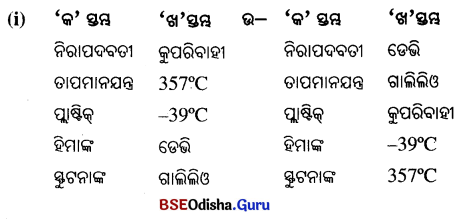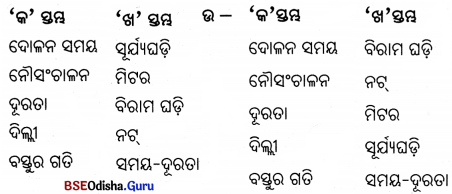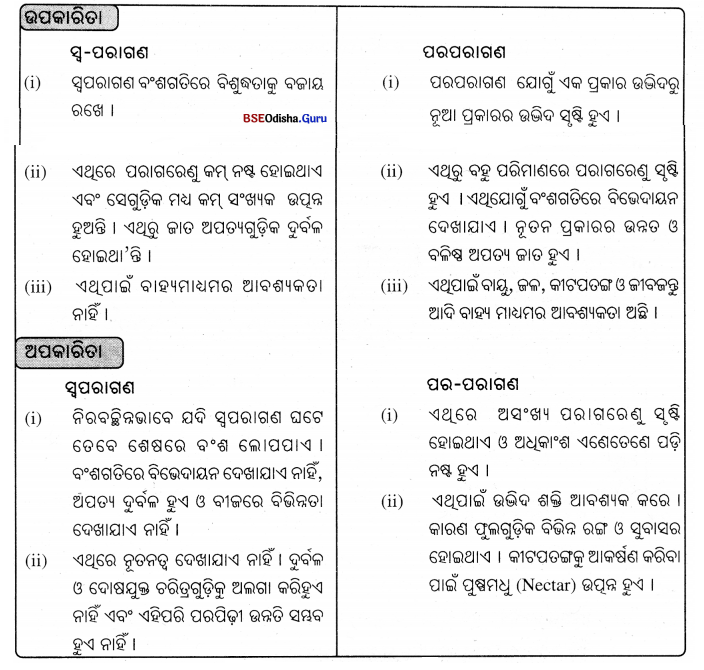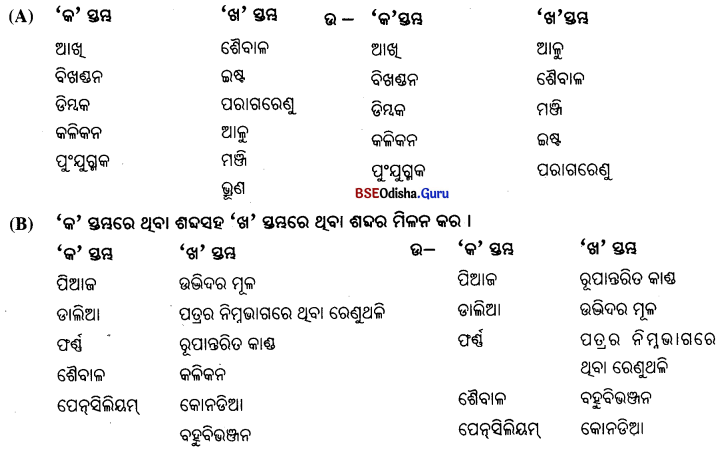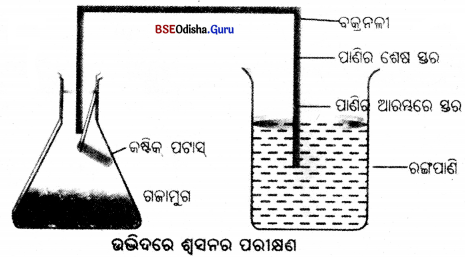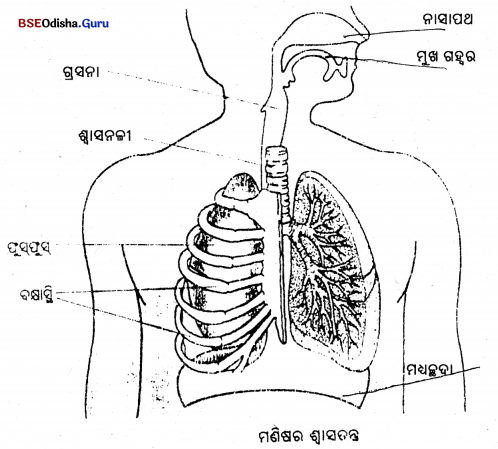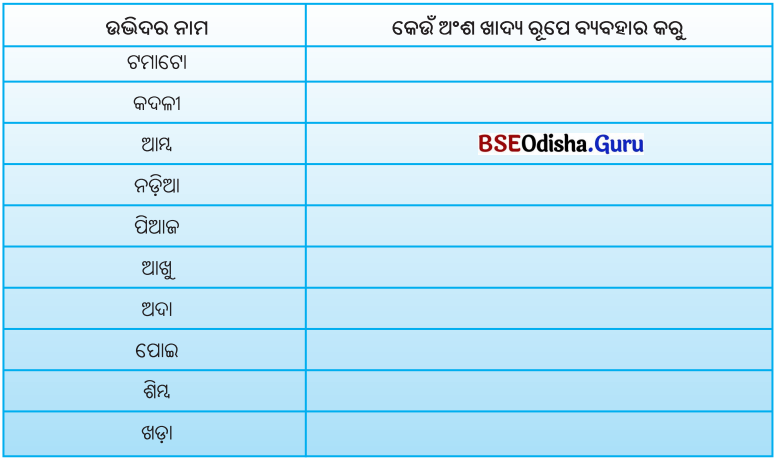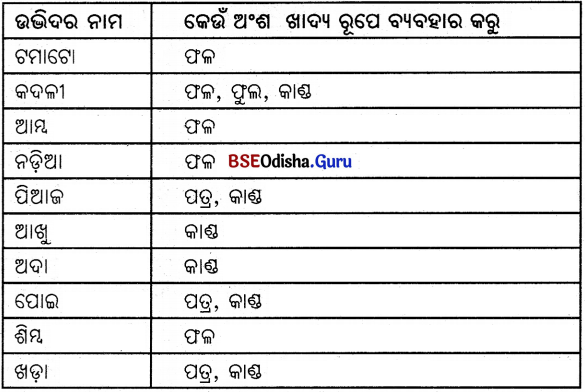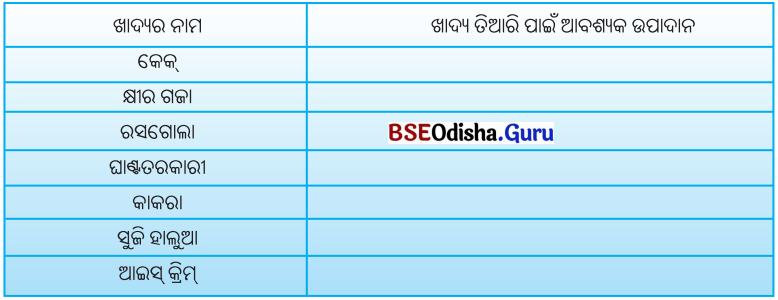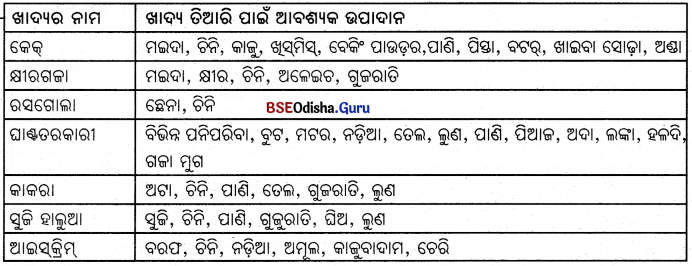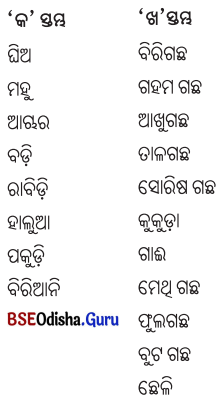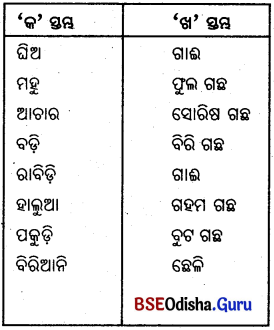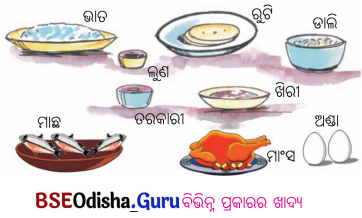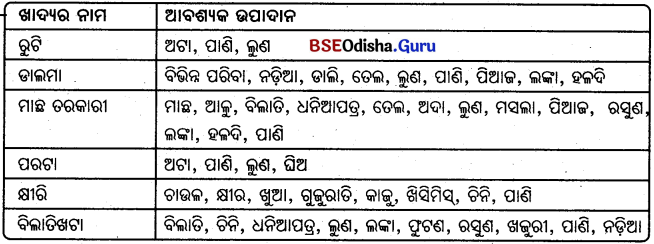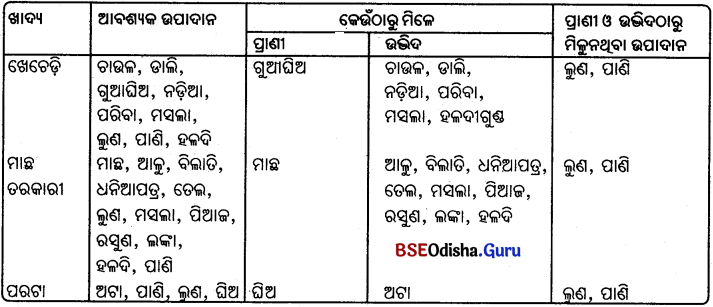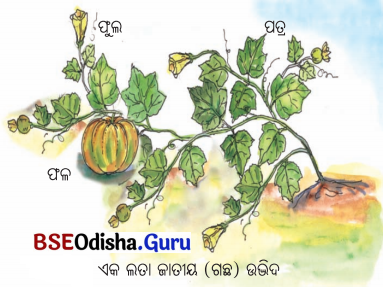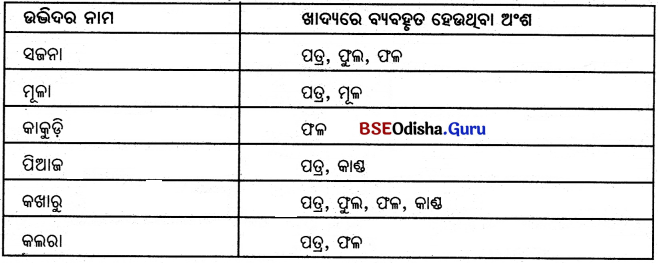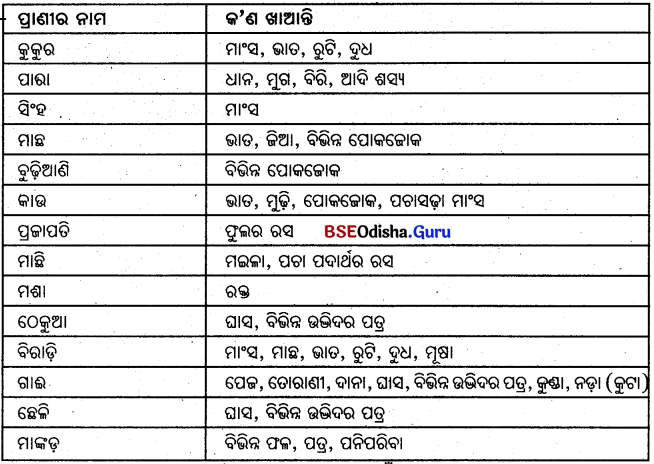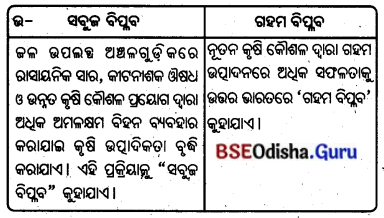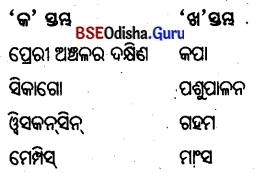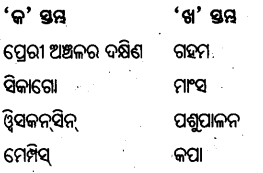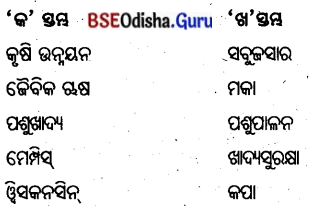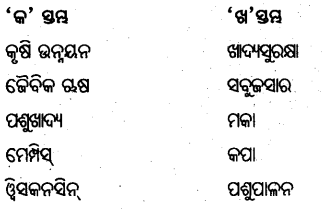Odisha State Board CHSE Odisha Class 12 Sociology Solutions Unit 2 ଭାରତୀୟ ସାମାଜିକ ସଂରଚନା Long Answer Questions.
CHSE Odisha 12th Class Sociology Unit 2 Long Answer Questions in Odia Medium
ଦୀର୍ଘ ଉତ୍ତରମୂଳକ ପ୍ରଶ୍ନୋତ୍ତର
୧ । ହିନ୍ଦୁ ଯୌଥ ପରିବାରର ସଂଜ୍ଞା ପ୍ରଦାନ କର ଏବଂ ଏହାର ମୁଖ୍ୟ ଲକ୍ଷଣ ବା ଉପାଦାନଗୁଡ଼ିକ ଆଲୋଚନା କର ।
Answer:
ଯୌଥ ପରିବାର ବା ଏକାନ୍ତବର୍ତ୍ତୀ ପରିବାର ଭାରତୀୟ ସାମାଜିକ ବ୍ୟବସ୍ଥାର ଏକ ଭିତ୍ତିସ୍ତମ୍ଭ କହିଲେ ଅତ୍ୟୁକ୍ତି ହେବନାହିଁ । ଏହା ଏକାତ୍ମକ ଏକକ ପରିବାରର ସମଷ୍ଟି କହିଲେ ଅତ୍ୟୁକ୍ତି ହେବ ନାହିଁ । ଏଥିପାଇଁ ସମ୍ଭବତଃ କେତେକ ସମାଜବିଜ୍ଞାନବିତ୍ ଯୌଥ ପରିବାରକୁ ମଧ୍ୟ ବିସ୍ତୃତ ପରିବାର ରୂପେ ଅଭିହିତ କରିଥା’ନ୍ତି ।
ଶ୍ରୀମତୀ ଇରାବତୀ କାର୍ଭେଙ୍କ ଭାଷାରେ, ‘ଯୌଥ ପରିବାର ହେଉଛି, ସାଧାରଣତଃ ଗୋଟିଏ ଛାତତଳେ ରହୁଥିବା, ଏକ ରୋଷେଇରେ ଖାଉଥିବା, ସାମୂହିକ ଭାବରେ ସମ୍ପତ୍ତିବାଡ଼ିର ଭୋଗ ଦଖଲ କରୁଥିବା, ମିଳିମିଶି ପୂଜା ଅର୍ଚ୍ଚନା କରୁଥିବା ଏବଂ ଏକ ନିର୍ଦ୍ଦିଷ୍ଟ ଜ୍ଞାତି ସମ୍ବନ୍ଧରେ ସମ୍ବନ୍ଧିତ ହୋଇଥିବା ଏକ ସମୂହ ।’’
ଲକ୍ଷଣ, ଉପାଦାନ ବା ଗୁଣ – ଉପରୋକ୍ତ ସଂଜ୍ଞାରୁ ଯୌଥ ପରିବାରର ନିମ୍ନଲିଖୁତ ବୈଶିଷ୍ଟ୍ୟ ବା ଲକ୍ଷଣ ସମ୍ବନ୍ଧରେ ସୂଚନା ମିଳିଥାଏ ।
(୧) ବୃହତ୍ ଅକାର (Large size) – ଯୌଥ ପରିବାରରେ ପିତାମାତା, ପ୍ରାପ୍ତ ଓ ଅପ୍ରାପ୍ତ ବୟସ୍କ ସନ୍ତାନ, ପିତାଙ୍କର ଭ୍ରାତୃବର୍ଗ ଓ ବୃଦ୍ଧ ପିତାମାତା ଏହିଭଳି ଦୁଇ ତିନି ପୁରୁଷର ଲୋକମାନଙ୍କ ସହିତ ଅନ୍ୟ କେତେକ ନିକଟ ସମ୍ପର୍କୀୟ ବାସ କରିଥା’ନ୍ତି । ଏଣୁ ଯୌଥ ପରିବାରର ଆକାର ବୃହତ୍ ଅଟେ ।
(୨) ସାଧାରଣ ବାସସ୍ଥଳୀ (Common Residence)- ଯୌଥ ପରିବାରର ସଦସ୍ୟମାନେ ଗୋଟିଏ ସାଧାରଣ ଗୃହରେ ବସବାସ କରିଥା’ନ୍ତି । କେତେକ କ୍ଷେତ୍ରରେ ପରିବାରର ସଦସ୍ୟଙ୍କ ସଂଖ୍ୟା ବୃଦ୍ଧି ଘଟିବା ଯୋଗୁଁ ବା ବାସସ୍ଥାନର ଅଭାବରୁ ସେମାନେ ଦୂରେଇ ରହିଲେ ମଧ୍ୟ ସମସ୍ତ ସଦସ୍ୟ ପରସ୍ପରର ନିକଟତର ହୋଇ ରହିଥା’ନ୍ତି ।
(୩) ସାଧାରଣ ରୋଷେଇଶାଳ (Common Kitchen) – ଯୌଥ ପରିବାରକୁ ଏକାନ୍ତବର୍ତ୍ତୀ ପରିବାର କୁହାଯାଇଥାଏ । ଏହାର କାରଣ ଯୌଥ ପରିବାରର ସମସ୍ତ ସଦସ୍ୟ ଗୋଟିଏ ସାଧାରଣ ରନ୍ଧନଶାଳାରେ ପ୍ରସ୍ତୁତ ଖାଦ୍ୟକୁ ଭୋଜନ କରିଥା’ନ୍ତି । ଏହି ସାଧାରଣ ଭୋଜନଶାଳା ଯୌଥ ପରିବାରର ଅକ୍ଷୁଣ୍ଣତା ଓ ସଂହତି ରକ୍ଷା କରିବାରେ ସହାୟକ ହୋଇଥାଏ।
(୪) ସାଧାରଣ ସମ୍ପରି (Common Property) – ଯୌଥ ପରିବାରର ସ୍ଥାବର ଓ ଅସ୍ଥାବର ସମ୍ପତ୍ତି ଯାହାକୁ ଉତ୍ତରାଧିକାର ସୂତ୍ରରେ ହେଉ ବା କୌଣସି ସଦସ୍ୟର ସଅର୍ଜିତ ହେଉ, ସମସ୍ତପ୍ରକାର ସମ୍ପତ୍ତି ଉପରେ ସମସ୍ତ ସଦସ୍ୟଙ୍କର ସମାନ ଅଧିକାର ଥାଏ । ପରିବାରର ମୁଖ୍ୟଙ୍କର ଉକ୍ତ ସମ୍ପତ୍ତିର ସମସ୍ତ ରକ୍ଷଣାବେକ୍ଷଣ ଦାୟିତ୍ଵ ବୋଲି ପ୍ରଥାଗତ ଭାବରେ ସ୍ଵୀକାର କରାଯାଇଥାଏ ।
(୫) ସାଧରଣ ଧର୍ମ (Common Religion) – ସାଧାରଣତଃ ଯୌଥ ପରିବାରର ସମସ୍ତ ସଦସ୍ୟ ଗୋଟିଏ ଧର୍ମରେ ବିଶ୍ଵାସ କରିଥା’ନ୍ତି । ଏହା ସହିତ ପ୍ରତ୍ୟେକ ଯୌଥ ପରିବାରର କେତେକ ସ୍ୱତନ୍ତ୍ର ପୂଜା-ଆରାଧନା, ଧାର୍ମିକ ବିଶ୍ଵାସ, ବ୍ରତ ଏବଂ ପର୍ବ ରହିଥାଏ । ପରିବାରର ସମସ୍ତ ସଦସ୍ୟ ସାମୂହିକ ଭାବରେ ଏହି ଧାର୍ମିକ ପୂଜା ଅର୍ଜନାରେ ଭାଗ ନେଇଥା’ନ୍ତି ।
(୬) ପାରସ୍ପରିକ ଅସ୍ଵୀକାର ଏବଂ କର୍ତ୍ତବ୍ୟବୋଧ (Mutual rights and duties) – ଯୌଥ ପରିବାରର ସମସ୍ତ ସଦସ୍ୟ ପରସ୍ପରର ଅଧିକାର ଓ ନୈତିକ କର୍ଭବ୍ୟ ପ୍ରତି ସଚେତନ ଥାଆନ୍ତି । ଆବଶ୍ୟକ ପଡ଼ିଲେ ଯୌଥ ପରିବାରର ସଦସ୍ୟ ନିଜର ସାର୍ଥକୁ ଜଳାଞ୍ଜଳି ଦେଇ ଅନ୍ୟମାନଙ୍କ ସ୍ବାର୍ଥସାଧନ କରିବାକୁ ପଛାଇ ନାଥା’ନ୍ତି ।

(୭) ଅତ୍ୟଧିକ ପୁରୁଷ ଗଭୀରତା (Generation of depth) – ଯୌଥ ପରିବାରର ଦୁଇ ତିନି ପୁରୁଷ ଜାତିଠାରୁ ଅଧ୍ଵ ପିଢ଼ିର ଲୋକମାନେ ବାସ କରନ୍ତି । ଏଣୁ ଯୌଥ ପରିବାରର ଅତ୍ୟଧ୍ବକ ପୁରୁଷ ଗଭୀରତା ଦେଖାଯାଇଥାଏ ।
(୮) କର୍ରାଙ୍କର ଶାସନ (Rule by Karta) – ଯୌଥ ପରିବାରରେ ସାଧାରଣ ବୟୋଜ୍ୟେଷ୍ଠ ବ୍ୟକ୍ତିଙ୍କୁ ଗୃହକର୍ତ୍ତା ବା ପରିବାରର ମୁଖ୍ କୁହାଯାଏ । ସେ ସମସ୍ତ ସ୍ଥାବର ଓ ଅସ୍ଥାବର ସମ୍ପତ୍ତିର ମାଲିକ । ପରିବାରର ସଦସ୍ୟମାନେ ସେମାନଙ୍କ ବ୍ୟକ୍ତିଗତ ଆୟକୁ ଗୃହକର୍ତ୍ତାଙ୍କ ପାଖରେ ଠୁଳ କରିଥା’ନ୍ତି । ପୁନଶ୍ଚ, ନିଜର ବ୍ୟକ୍ତିଗତ ଖର୍ଚ୍ଚ ପାଇଁ ତାଙ୍କଠାରୁ ନେଇଥା’ନ୍ତି । ସେ ପରିବାରର ଶାସକ ଏବଂ ପରିବାରର ସମସ୍ତ ସଦସ୍ୟ ତାଙ୍କର ନିୟନ୍ତ୍ରଣରେ ପରିଚାଳିତ ହୋଇଥା’ନ୍ତି ।
(୯) ଅପେକ୍ଷାକୃତ ସ୍ଥାୟୀ ସଂସ୍ଥା (Relatively permanent institution) – ଯୌଥ ପରିବାର ଅପେକ୍ଷାକୃତ ଏକ ସ୍ଥାୟୀ ସଂସ୍ଥା ଅଟେ । ଯଦିଓ ଆଧୁନିକ ଯୁଗରେ ଯୌଥ ପରିବାର ଅନେକ କାରଣରୁ ପ୍ରଭାବିତ ହୋଇଅଛି, ତଥାପି ଯୌଥ ପରିବାରର ମନୋବୃତ୍ତିରେ ସେଭଳି ଆଶାନୁରୂପକ ପରିବର୍ତ୍ତନ ହୋଇନାହିଁ ।
(୧୦) ସାମ୍ୟବାଦୀ ସଙ୍ଗଠନ (Socialistic Organisation) – ଯୌଥ ପରିବାର ସାମ୍ୟବାଦୀ ନୀତି ଉପରେ ପ୍ରତିଷ୍ଠିତ । ଏହାର ସଦସ୍ୟମାନେ ନିଜ ନିଜ ଦକ୍ଷତା ଓ କ୍ଷମତା ଅନୁସାରେ କାର୍ଯ୍ୟ କରିଥା’ନ୍ତି । ମାତ୍ର ସମସ୍ତଙ୍କ ଆବଶ୍ୟକତାକୁ ଆଗରେ ରଖ୍ ସୁବିଧା ସୁଯୋଗର ପାତ୍ର ହୋଇଥା’ନ୍ତି । ଏହି ଦୃଷ୍ଟିରୁ ଯୌଥ ପରିବାର ସାମ୍ୟବାଦ ତତ୍ତ୍ଵକୁ ବଜାୟ ରଖୁଥାଏ ।
୨ । ଇଲମ୍ (ELAM) ସମ୍ବନ୍ଧରେ ଏକ ସଂକ୍ଷିପ୍ତ ଟିପ୍ପଣୀ ଲେଖ ।
Answer:
‘ଇଲମ୍’ ହେଉଛି ଏକପ୍ରକାର ପିତୃତାନ୍ତ୍ରିକ ହିନ୍ଦୁ ଯୌଥ ପରିବାର ଯାହାକି କେରଳର ନମ୍ବୁଦ୍ରି ବ୍ରାହ୍ମଣ ସମ୍ପ୍ରଦାୟରେ ଦେଖିବାକୁ ମିଳିଥାଏ । ସାଧାରଣତଃ ହିନ୍ଦୁ ପରିବାର ଭଳି ଇଲମ୍ବର ସମସ୍ତ ସଦସ୍ୟମାନଙ୍କର ସମ୍ପତ୍ତି ଉପରେ ସମାନ ଅଧିକାର ରହିଥାଏ । କିନ୍ତୁ ଇଲମର ସମ୍ପରି ଅବିଭାଜିତ ଅଟେ । ଯଦି ଆବଶ୍ୟକ ପଡ଼େ ତାହାହେଲେ ସମସ୍ତ ସଦସ୍ୟମାନଙ୍କର ମତାମତକୁ ବିଚାରକୁ ନେଇ ସମ୍ପତ୍ତିର ବିଭାଜନ ହୋଇଥାଏ ।
ନମ୍ବୁଦ୍ରି ପରିବାରର ପ୍ରଥା ଅନୁସାରେ କେବଳ ଜ୍ୟେଷ୍ଠଭ୍ରାତା ନିଜ ଜାତିର କନ୍ୟାଙ୍କୁ ବିବାହ କରିଥା’ନ୍ତି ଏବଂ କନିଷ୍ଠ ଭ୍ରାତାମାନେ ନାୟାର ଜାତିର ଝିଅମାନଙ୍କୁ ବିବାହ କରିଥା’ନ୍ତି । କେବଳ ଜ୍ୟେଷ୍ଠଭ୍ରାତାଙ୍କର ପିଲାମାନେ ଇଲମ୍ବରେ ରହିବା ସୁଯୋଗ ପାଇଥା’ନ୍ତି । ଫଳରେ ପରିବାରରେ ଏକତା ସଂହତି ସମ୍ଭବପର ହୋଇନଥାଏ । ଯେହେତୁ ନାୟାର ମାତୃସ୍ଥାନିକ ଅଟେ, କନିଷ୍ଠ ଭ୍ରାତାମାନେ ସେମାନଙ୍କ ପିଲାମାନଙ୍କ ସହିତ ସ୍ତ୍ରୀ ଗୃହରେ ବାସ କରନ୍ତି ।
ଯଦି ଜ୍ୟେଷ୍ଠଭ୍ରାତା କୌଣସି ସନ୍ତାନ ଜନ୍ମ କରିବାରେ ଅକ୍ଷମ ହୁଅନ୍ତି, ତେବେ ସେ କ୍ଷେତ୍ରରେ ତାଙ୍କ ତଳ ଭାଇ ନିଜ ଜାତିରେ ବିବାହ କରିବାର ସୁଯୋଗ ପାଆନ୍ତି । ଯେହେତୁ ସାନଭାଇମାନେ ସେମାନଙ୍କ ସ୍ତ୍ରୀ ଗୃହରେ ବାସ କରନ୍ତି, ତେଣୁ ଏ କ୍ଷେତ୍ରରେ ପରିବାର ସମ୍ପତ୍ତିକୁ ବିଭାଜନ କରିବାର ଆବଶ୍ୟକତା ଦେଖାଯାଇ ନ ଥାଏ ।
ଜ୍ୟେଷ୍ଠଭ୍ରାତା ‘ଇଲମ୍’ର ମୁଖ୍ୟ ଅଟନ୍ତି । ସମ୍ପତ୍ତିକୁ ତଦାରଖ କରିବାର ଦାୟିତ୍ବ ତାଙ୍କ ହସ୍ତରେ ନ୍ୟସ୍ତ ଥାଏ; କିନ୍ତୁ ଅନ୍ୟ ସଦସ୍ୟମାନଙ୍କର ଅନୁମତି ବିନା ସେ ସମ୍ପଭିକୁ ବିକ୍ରି କରିପାରିବେ ନାହିଁ କିମ୍ବା ଦାନସୂତ୍ରରେ କାହାକୁ ଅର୍ପଣ କରିପାରିବେ ନାହିଁ ।
୩ । ତରଓ୍ବାଡ଼ (Tarwad) ସମ୍ବନ୍ଧରେ ଏକ ସଂକ୍ଷିପ୍ତ ଟିପ୍ପଣୀ ଲେଖ ।
Answer:
ନମ୍ବୁଦ୍ରି ବ୍ରାହ୍ମଣମାନଙ୍କର ଯୌଥ ପରିବାର ‘ଇଲମ୍’ ପରି କେରଳର ନାୟାର ସମ୍ପ୍ରଦାୟର ଯୌଥ ପରିବାରକୁ ‘ତରୱାଡ଼’ କୁହାଯାଏ । ଏହା ଏକ ମାତୃସ୍ଥାନିକ ହିନ୍ଦୁ ଯୌଥ ପରିବାର । ଏହି ପରିବାରର ବ୍ୟବସ୍ଥାନୁସାରେ ବିବାହ ପରେ ସାମୀ ସଗୃହ ପରିତ୍ୟାଗ କରି ସ୍ତ୍ରୀ ଗୃହରେ ବାସ କରିଥାଏ । ସାଧାରଣତଃ, ଜଣେ ସ୍ତ୍ରୀ, ତାଙ୍କର ପୁତ୍ରକନ୍ୟା ଏବଂ କନ୍ୟାରପୁତ୍ରକନ୍ୟାଙ୍କୁ ନେଇ ‘ତରୱାଡ଼’ ଗଠିତ । ଏଠାରେ ମନେରଖୁବା ଉଚିତ ଯେ, ପୁତ୍ରର ପୁତ୍ରକନ୍ୟାମାନଙ୍କୁ ତରୱାଡ଼ରେ ଅନ୍ତର୍ଭୁକ୍ତ କରାଯାଇ ନ ଥାଏ ।
କାରଣ ସେମାନେ ସେମାନଙ୍କର ସ୍ତ୍ରୀମାନଙ୍କ ମା’ଙ୍କ ତରୱାଡ଼ରେ ବାସ କରିଥା’ନ୍ତି । ଏହି ଦୃଷ୍ଟିରୁ ‘ତରଓ୍ବାଡ଼’ର ନିମ୍ନଲିଖ୍ତ ଲକ୍ଷଣମାନ ଦୃଷ୍ଟିଗୋଚର ହୋଇଥାଏ; ଯଥା-
(a) ଏହା ଏକ ମାତୃସ୍ଥାନିକ ହିନ୍ଦୁ ଯୌଥ ପରିବାର ।
(b) ତରୱାଡ଼ରେ ବଂଶପରମ୍ପରା ମା’ଙ୍କ ଆଡୁ ଗଣନା କରାଯାଇଥାଏ । ଏଣୁ ଏହା ଏକ ମାତୃବଂଶିକ (Matri- lineal) ପରିବାର ଅଟେ ।
(c) ତରୱାଡ଼ର ସମ୍ପତ୍ତି ଉପରେ ଉଭୟ ପୁରୁଷ ଏବଂ ନାରୀମାନଙ୍କର ସମାନ ଅଧିକାର ଥାଏ ।
(d) ‘ଇଲମ୍’ ପରି ତରୱାଡ଼ର ସମ୍ପତ୍ତି ବିଭାଜନ ମଧ୍ୟ ସହଜସାଧ୍ୟ ନୁହେଁ କାରଣ ଏଥିପାଇଁ ଏହାର ସମସ୍ତ ସଦସ୍ୟଙ୍କ ସମ୍ମତି ତଥା ଅନୁମତି ଆବଶ୍ୟକ ।
(e) ପରିବାରର ବୟୋଜ୍ୟେଷ୍ଠ ପୁରୁଷ ବ୍ୟକ୍ତି ‘ତରଓ୍ବାଡ଼’ର ପରିଚାଳକ ଭାବରେ କାର୍ଯ୍ୟ ସମ୍ପାଦନ କରିଥା’ନ୍ତି । ସେ କର୍ଣ୍ଣବାଣ (Karnavana) ନାମରେ ପରିଚିତ ।
(f) ପାରିବାରର ସମ୍ପରି ଉପରେ କର୍ପୂବାଣଙ୍କର ଅସୀମ କ୍ଷମତା ଥିଲେ ମଧ୍ୟ ତରଓ୍ବାଡ଼ର ସଦସ୍ୟଙ୍କ ବିନା ସ୍ୱୀକୃତିରେ ଏହାର ହସ୍ତାନ୍ତରଣ କରିପାରନ୍ତି ନାହିଁ ।
(g) ଯଦି କଣ୍ଠବାଣ କୌଣସି ଶାରୀରିକ ବା ମାନସିକ ଦୃଷ୍ଟିକୋଣରୁ ପରିବାରକୁ ସୁପରିଚାଳନା ପାଇଁ ଅସମର୍ଥ ହୁଅନ୍ତି ତେବେ ସେ ପରିସ୍ଥିତିରେ ବରିଷ୍ଠତା କ୍ରମେ ପରବର୍ତ୍ତୀ ବୟୋଜ୍ୟେଷ୍ଠ ସଦସ୍ୟ କଣ୍ଠବାଣ ଭାବରେ ଦାୟିତ୍ଵ ବହନ କରିଥା’ନ୍ତି । ପୁନଶ୍ଚ ଯଦି ତରୱାଡ଼ର ସଦସ୍ୟମାନେ ଅନୁଭବ କରନ୍ତି ଯେ ସେମାନେ କର୍ପୂବାଣଙ୍କର ବ୍ୟବହାରରେ ଅତିଷ୍ଠ ବା ସେ ଅବିଶ୍ଵାସର ପାତ୍ର ବା ସେ ପରିବାରକୁ ଚଳାଇବାରେ ଅସମର୍ଥ ତେବେ ତାଙ୍କୁ ଉକ୍ତ ପଦବୀରୁ ବହିଷ୍କାର କରାଯାଇପାରେ ।
(h) ଯେତେବେଳେ ତରୱାଡ଼ର ଆକାର ବଢ଼ିଯାଏ ଏବଂ ଏହାର ସୁପରିଚାଳନାରେ ସମସ୍ୟା ଦେଖାଯାଏ, ସେତେବେଳେ ମୁଖ୍ୟ ତରୱାଡ଼କୁ କେତୋଟି ଛୋଟ ଛୋଟ ଏକକରେ ବିଭକ୍ତ କରାଯାଇଥାଏ । ଏହି ଛୋଟ ଛୋଟ ଏକକକୁ ଟାଭାଜି (Tabhazhis) କୁହାଯାଏ । ତରଓ୍ବାଡ଼ ପରି ପ୍ରତ୍ୟେକ ଟାଭାଜି ଜଣେ ସ୍ତ୍ରୀ, ତା’ର ପୁତ୍ର ଓ କନ୍ୟା ଏବଂ କନ୍ୟାର ପୁତ୍ର ଓ କନ୍ୟାକୁ ନେଇ ଗଠିତ ହୋଇଥାଏ । ତଡ଼କୁ ଟାଭାଜି ଭାବରେ ବିଭାଜନ କରିବାକୁ ହେଲେ ତରୱାଡ଼ର ସମସ୍ତ ସଦସ୍ୟଙ୍କ ସମ୍ମତିର ଆବଶ୍ୟକତା ପଡିଥାଏ । ବିଶାଳତା ଦୃଷ୍ଟିରୁ ତରୱାଡର ବିଭାଜନ ହେଲେ ମଧ୍ୟ ତରୱାଡ଼ ସହିତ ପ୍ରତ୍ୟେକ ଟାଭାଜିର ଘନିଷ୍ଠ ସମ୍ପର୍କ ରହିଥାଏ ।
(i) ଯେତେବେଳେ ମୁଖ୍ୟ ତରୱାଡ଼ ଭାଗ ଭାଗ ହୋଇଯାଏ ସେତେବେଳେ ତରୱାଡ଼ର ସମ୍ପରିକୁ ଟାଭାଜିଗୁଡ଼ିକ ମଧ୍ୟରେ ସମାନ ଭାବରେ ବାଣ୍ଟି ଦିଆଯାଇଥାଏ । ଏହି ବିଭାଜନ ପରେ ଟାଭାଜିର ମୂଳ ତରୱାଡ଼ର ସମ୍ପତ୍ତି ଉପରେ କୌଣସି ଅଧିକାର ନଥାଏ ।
(j) ତରୱାଡ଼ର କୌଣସି ସଦସ୍ୟ ନିଜର ଉଦ୍ୟମ ବଳରେ ସମ୍ପଭି ଅର୍ଜନ କରିବା ଓ ଉକ୍ତ ସମ୍ପଭିର ହସ୍ତାନ୍ତରଣ କରିବାର ଅଧିକାର ପାଇଥାଏ । ମାତ୍ର ତା’ର ମୃତ୍ୟୁ ପରେ ଏହା ତରୱାଡ଼ର ସମ୍ପତ୍ତି ଭିତରେ ସାମିଲ୍ ହୋଇଯାଇଥାଏ ।
୪ । ଯୌଥ ପରିବାରର ଉପକାରିତା ଏବଂ ପ୍ରକାର୍ଯ୍ୟମାନ ବର୍ଣ୍ଣନା କର ।
Answer:
ବ୍ୟକ୍ତିର ସାମାଜିକ ଜୀବନରେ ଯୌଥ ପରିବାର ବିଶେଷ ଭୂମିକା ଗ୍ରହଣ କରିଥାଏ । ଏହି ଯୌଥ ପରିବାର ବ୍ୟକ୍ତିର ଅର୍ଥନୈତିକ, ଧାର୍ମିକ ଏବଂ ସାଂସ୍କୃତିକ ଜୀବନକୁ ମଧ୍ୟ ପ୍ରଭାବିତ କରିଥାଏ । ଏହା ପ୍ରାଥମିକ ସାମାଜିକ ଅନୁଷ୍ଠାନ ଭାବେ ବିଭିନ୍ନ ପ୍ରକାର ପ୍ରକାର୍ଯ୍ୟକୁ ସମ୍ପାଦନ କରିବାରେ ଅଦ୍ଵିତୀୟ ଭୂମିକା ଗ୍ରହଣ କରିଥାଏ । ଏହି ପ୍ରକାର୍ଯ୍ୟଗୁଡ଼ିକ ମଧ୍ୟ ଯୌଥ ପରିବାରର ଉପକାରିତା ଭାବେ ବିଚାର କରାଯାଇଥାଏ । ଏଗୁଡ଼ିକ ନିମ୍ନରେ ଆଲୋଚନା କରାଗଲା ।
(1) ଅର୍ଥନୈତିକ ଉପକାରିତା (Economical Advantages)– ଅର୍ଥନୈତିକ ଦୃଷ୍ଟିକୋଣରୁ ଯୌଥ ପରିବାର ଗୁରୁତ୍ଵପୂର୍ଣ୍ଣ ଅଟେ । ଏହା ଭୂସମ୍ପତ୍ତିକୁ ବିଭାଜନରୁ ରକ୍ଷା କରିଥାଏ । ଫଳରେ ଶସ୍ୟ ଅମଳର ମାତ୍ରାକୁ ବୃଦ୍ଧି କରିବାରେ ସାହାଯ୍ୟ କରିଥାଏ । ଯଦି ଭୂସମ୍ପତ୍ତିର ବିଭାଜନ ଘଟେ ତେବେ ଚାଷକାର୍ଯ୍ୟ ପାଇଁ ବିପୁଳ ଅର୍ଥବ୍ୟୟର ଆବଶ୍ୟକତା ଦେଖାଯାଇଥାଏ, ଯୌଥ ପରିବାରରେ ଏହି ପ୍ରକାର ଅସୁବିଧା ସୃଷ୍ଟି ହୋଇ ନ ଥାଏ । ପରିବାରର ସଦସ୍ୟମାନେ ଶ୍ରମବିଭାଜନ ଭିଭିରେ ବିଭିନ୍ନ କାର୍ଯ୍ୟଗୁଡିକୁ ସମ୍ପନ୍ନ କରିଥା’ନ୍ତି |
ଭୂସମ୍ପରିର ଅବିଭକ୍ତ ଯୋଗୁଁ ଓ ସମସ୍ତେ ମିଳିମିଶି ଚାଷକାର୍ଯ୍ୟ କରିବାଦ୍ୱାରା କୃଷି ଉତ୍ପାଦନ ବୃଦ୍ଧି ପାଇଥାଏ । ସଦସ୍ୟମାନଙ୍କୁ ଉପାର୍ଜନକ୍ଷମ ହେବା ପାଇଁ ଯୌଥ ପରିବାର ତାଲିମ୍ ଦେଇଥାଏ । ଆଉ ମଧ୍ୟ ସଦସ୍ୟମାନଙ୍କର ଆୟକୁ କେନ୍ଦ୍ରକରି ଏକ ‘ମିଳିତ ପାଣ୍ଠି’ ଗଠନ କରାଯାଏ । ଆବଶ୍ୟକ ସମୟରେ ସଦସ୍ୟମାନଙ୍କର ଶିକ୍ଷା, ସ୍ଵାସ୍ଥ୍ୟ ଏବଂ ଆମୋଦପ୍ରମୋଦ ପାଇଁ ଆବଶ୍ୟକ ପଡୁଥିବା ଖର୍ଚ୍ଚ ଯୌଥ ପରିବାର ସେହି ପାଣ୍ଠିରୁ ପୂରଣ କରିଥାଏ । ତେଣୁ ଯୌଥ ପରିବାରକୁ ଏକ ‘ସମବାୟ ବ୍ୟାଙ୍କ’ (Co-Operative Bank) ବୋଲି କୁହାଯାଏ ।
(2) ସଦସ୍ୟମାନଙ୍କର ନିରାପତ୍ତା (Protection of members)- ଯୌଥ ପରିବାର ତା’ର ସମସ୍ତ ସଦସ୍ୟମାନଙ୍କୁ ସାମାଜିକ ନିରାପତ୍ତା ଯୋଗାଇଥାଏ । ଜଣେ ବ୍ୟକ୍ତିର ଦୁର୍ଦ୍ଦିନ ସମୟରେ ଅନ୍ୟ ବ୍ୟକ୍ତିମାନେ ତାକୁ ସାହାଯ୍ୟ କରିବାପାଇଁ ଆଗଭର ହୋଇ ବାହାରି ଆସନ୍ତି । କୌଣସିପ୍ରକାର ବାଧ୍ୟବାଧକତା ଯୋଗୁଁ ସେମାନେ ଏ କାର୍ଯ୍ୟ କରି ନ ଥା’ନ୍ତି, ବରଂ ଏକପ୍ରକାର କର୍ତ୍ତବ୍ୟବୋଧ ସେମାନଙ୍କୁ କାର୍ଯ୍ୟ କରିବାପାଇଁ ପ୍ରେରଣା ଯୋଗାଇଥାଏ ।
ଯୌଥ ପରିବାର ହେଉଛି ବୃଦ୍ଧ, ଅକର୍ମଣ୍ୟ, ବିଧବା ଏବଂ ପିତୃମାତୃହୀନ ବାଳକବାଳିକାମାନଙ୍କ ପାଇଁ ଏକ ଆଦର୍ଶ ରହଣିସ୍ଥଳ । ଆଉ ମଧ୍ୟ ଯୌଥ ପରିବାର ମୃତବ୍ୟକ୍ତିର ପିଲାମାନଙ୍କର ଉଚିତ ଯତ୍ନ ନେଇଥାଏ । ଯୌଥ ପରିବାରକୁ ଫ୍ରଶସାକରି ପୂର୍ବତନ ପ୍ରଧାନମନ୍ତ୍ରୀ ସ୍ବର୍ଗତ ପଣ୍ଡିତ ଜବାହରଲାଲ୍ ନେହେରୁ କହିଛନ୍ତି ଯେ, ଏହି ଯୌଥ ପରିବାରର ମାନସିକ ଏବଂ ଶାରୀରିକ ଦୁର୍ବଳ ବ୍ୟକ୍ତିମାନଙ୍କ ପାଇଁ ଏକ ସାମାଜିକ ବୀମାରୂପେ କାର୍ଯ୍ୟ କରିଥାଏ ।
(3) ଚିତ୍ତବିନୋଦନ ପ୍ରକାର୍ଯ୍ୟ (Means of recreation)– ଯୌଥ ପରିବାର ତା’ର ସଦସ୍ୟମାନଙ୍କୁ ଆମୋଦପ୍ରମୋଦର ସୁବିଧା ଯୋଗାଇଥାଏ । ଏକ ସରଳ, ସୁନ୍ଦର ଏବଂ ଶାନ୍ତିପୂର୍ଣ୍ଣ ଜୀବନଯାପନ ପାଇଁ ଏହି ପରିବାର ସମସ୍ତ ବ୍ୟବସ୍ଥା କରିଥାଏ । ଯୌଥ ପରିବାରରେ ଛୋଟ ଛୋଟ ପିଲାମାନଙ୍କର କ୍ରୀଡ଼ାକୌତୁକ ବୟୋଜ୍ୟେଷ୍ଠ ବ୍ୟକ୍ତିମାନଙ୍କୁ ଯଥେଷ୍ଟ ଆନନ୍ଦ ଯୋଗାଇଥାଏ । ଆଉ ମଧ୍ୟ ପରିବାରର ପୁରୁଷ ବ୍ୟକ୍ତିମାନେ ଦିନବେଳା ଅକ୍ଳାନ୍ତ ପରିଶ୍ରମ କରି କ୍ଲାନ୍ତିବୋଧ କରିଥା’ନ୍ତି ।
ସନ୍ଧ୍ୟା ସମୟରେ ଯେତେବେଳେ ସେମାନେ ଗୃହକୁ ପ୍ରତ୍ୟାବର୍ତ୍ତନ କରନ୍ତି ଏବଂ ସେମାନଙ୍କର ସ୍ତ୍ରୀ ଏବଂ ପିଲାମାନଙ୍କର ସଂସ୍ପର୍ଶରେ ଆସନ୍ତି, ସେମାନଙ୍କର କ୍ଳାନ୍ତି କେତେକାଂଶରେ ଦୂର ହୋଇଯାଏ । ଭାଇଭଉଣୀମାନଙ୍କ ମଧ୍ୟରେ ସୃଷ୍ଟି ହେଉଥିବା କୌତୁକ ଏବଂ ସ୍ନେହଭାବ ପରିବାର ମଧ୍ୟରେ ଏକ ବନ୍ଧୁତ୍ଵପୂର୍ଣ୍ଣ ପରିବେଶ ତିଆରି କରିଥାଏ । ସାଧାରଣତଃ କୁହାଯାଇପାରେ ଯେ ଯୌଥ ପରିବାର ଏକ କ୍ଲବ୍ର ଭୂମିକା ସଂପାଦନ କରିଥାଏ ।
(4) ବ୍ୟକ୍ତିତ୍ବର ବିକାଶ (Development of personality) – ଯୌଥ ପରିବାର ତା’ର ସଦସ୍ୟମାନଙ୍କର ବ୍ୟକ୍ତିତ୍ଵ ଅଭିବୃଦ୍ଧି ପାଇଁ ଯଥେଷ୍ଟ ସାହାଯ୍ୟ କରିଥାଏ । ଏହା ସଦସ୍ୟମାନଙ୍କର ବିଭିନ୍ନ ସଦ୍ଗୁଣଗୁଡ଼ିକ ଶିକ୍ଷାଦେବା ସଂଗେ ସଂଗେ ସେମାନଙ୍କୁ ସମାଜବିରୋଧୀ କାର୍ଯ୍ୟରୁ ନିବୃତ୍ତ କରିଥାଏ । ଏହା ବ୍ୟକ୍ତିକୁ ସ୍ନେହ, ଶୃଙ୍ଖଳା ଜ୍ଞାନ, ଆଜ୍ଞାନୁବର୍ତ୍ତିତା, ଆନ୍ମୋତ୍ସର୍ଗ, ଦୟା, କ୍ଷମା, ନିଃସ୍ବାର୍ଥପରତା, ସହାନୁଭୂତି ପ୍ରଭୃତି ଅପରିହାର୍ଯ୍ୟ ଗୁଣଗୁଡ଼ିକ ଶିକ୍ଷା ଦେଇଥାଏ । ଏହା ଭବିଷ୍ୟତରେ ବ୍ୟକ୍ତିକୁ ସମାଜରେ ଜଣେ ଆଦର୍ଶ ନାଗରିକ ଭାବେ ପ୍ରତିଷ୍ଠିତ କରିବାରେ ସାହାଯ୍ୟ କରିଥାଏ । ଫଳରେ ବ୍ୟକ୍ତିର କାର୍ଯ୍ୟକଳାପ ଏବଂ ସାମାଜିକ ସମ୍ପର୍କ ଯଥେଷ୍ଟ ଭାବେ ମାର୍ଜିତ ହୋଇଥାଏ ଏବଂ ତା’ର ବ୍ୟକ୍ତିତ୍ଵର ଫଳପ୍ରଦ ବିକାଶ ଘଟିଥାଏ ।
(5) ଧନ କ୍ଷେତ୍ରରେ ସମାଜସେବୀ |(Socialisim in wealth)- ସାର୍ ହେନେରୀ ମେନ୍ | (Sir Henery Maine) ମତରେ, ‘‘ଯୌଥ ପରିବାର ହେଉଛି ଏକ ସଂସ୍ଥା ଯେଉଁ ସଂସ୍ଥାର ମାଲିକ ହେଉଛନ୍ତି ପିତା ବା ପରିବାରର ବୟୋଜ୍ୟେଷ୍ଠ ପୁରୁଷ ବ୍ୟକ୍ତି ।’’ ଯଥାର ଏବଂ ବେରୀ (Jathar and Berry) ଙ୍କ ମତରେ, ‘ଯୌଥ ପରିବାରରେ ପ୍ରତ୍ୟେକ ବ୍ୟକ୍ତି ନିଜର ଦକ୍ଷତା ଅନୁସାରେ କାର୍ଯ୍ୟ କରିଥାଏ ଏବଂ ଆବଶ୍ୟକତା ଅନୁସାରେ ଗ୍ରହଣ କରିଥାଏ, ଯାହାକି ସମାଜବାଦର ନିୟମକୁ ପୂରଣ କରିଥାଏ ।’’
ଏହି ସମାଜବାଦର ମୁଖ୍ୟ ନିୟମ ହେଉଛି ବ୍ୟକ୍ତି ଯେତିକି କାର୍ଯ୍ୟ କରିବାପାଇଁ ସମର୍ଥ ସେ ସେତିକି କାର୍ଯ୍ୟ କରିବ ଏବଂ ତା’ ପାଇଁ ଯେତିକି ଆବଶ୍ୟକ ସେ ସେତିକି ଗ୍ରହଣ କରିପାରିବ ।

(6) ଧାର୍ମିକ ପ୍ରକାର୍ଯ୍ୟ (Religious functions) – ଯୌଥ ପରିବାର ବିଭିନ୍ନ ଧାର୍ମିକ ପ୍ରକାର୍ଯ୍ୟଗୁଡ଼ିକ ସଂପାଦନ କରିଥାଏ । ଏହି ପରିବାର ହେଉଛି ଧାର୍ମିକ ପୂଜାବିଧୂର ଏକ କେନ୍ଦ୍ରସ୍ଥଳୀ । ଏହା ସହିତ ଯୌଥ ପରିବାର ତା’ର ସଦସ୍ୟମାନଙ୍କୁ ବହୁ ଆଧ୍ୟାତ୍ମିକ ଗୁଣମାନ ଶିକ୍ଷା ଦେଇଥାଏ । ପଣ୍ଡିତମାନଙ୍କୁ ନିମନ୍ତ୍ରଣ କରି ବହୁ ଧର୍ମୋପଦେଶ ଆଦିର ଚର୍ଚ୍ଚା କରିଥାଏ । ଜନ୍ମ, ବିବାହ ଏବଂ ମୃତ୍ୟୁଜନିତ ଉତ୍ସବ ସମୟରେ ପରିବାର ବହୁ ଧାର୍ମିକ କାର୍ଯ୍ୟମାନ ସଂପାଦନ କରିଥାଏ । ଏହି ପରିବାରରେ ଧାର୍ମିକ ଉପାସନା ସଦସ୍ୟମାନଙ୍କର ଦୈନନ୍ଦିନ ବ୍ୟବହାରକୁ ନିୟନ୍ତ୍ରଣ କରିଥାଏ । ଫଳରେ ସଦସ୍ୟମାନେ ଧର୍ମବିଚ୍ୟୁତ ହେବାର ଲକ୍ଷ୍ୟ କରାଯାଇ ନ ଥାଏ ।
(7) ଶିକ୍ଷାଗତ ପ୍ରକାର୍ଯ୍ୟ (Educational functions) -ପରିବାର ତା’ର ସଦସ୍ୟମାନଙ୍କର ପ୍ରାଥମିକ ଶିକ୍ଷା ପ୍ରତି ଅଧିକ ଯତ୍ନ ନେଇଥାଏ । ପରିବାର ମଧ୍ୟରେ ପିତାମାତା ଏବଂ ଅନ୍ୟ ଗୁରୁଜନମାନଙ୍କ ସଂସ୍ପର୍ଶରେ ଆସି ଶିଶୁର ପ୍ରାଥମିକ ଶିକ୍ଷା ଆରମ୍ଭ ହୋଇଥାଏ । ତେଣୁ ଯୌଥ ପରିବାରକୁ ଶିଶୁର ପ୍ରଥମ ଶିକ୍ଷାକେନ୍ଦ୍ର ବୋଲି କୁହାଯାଏ । ଏହି ପରିପ୍ରେକ୍ଷୀରେ ମାଜିନ୍(Mazzin) କହିଛନ୍ତି, ଶିଶୁର ପ୍ରଥମ ପାଠପଢ଼ା ମାତାଙ୍କର ଚୁମ୍ବନ ଓ ପିତାଙ୍କର ସଯତ୍ନ ମଧ୍ୟରେ ଆରମ୍ଭ ହୋଇଥାଏ ।
(8) ସାମାଜିକୀକରଣ (Socialisation) – ବ୍ୟକ୍ତିର ସାମାଜିକୀକରଣ କ୍ଷେତ୍ରରେ ଯୌଥ ପରିବାରର ଭୂମିକା ଗୁରୁତ୍ଵପୂର୍ଣ୍ଣ ଅଟେ । ଗୋଟିଏ ଐକିକ ପରିବାରରେ ଶୃଙ୍ଖଳା ଏବଂ ଶିକ୍ଷାଦାନ ପଦ୍ଧତି କେତେକାଂଶରେ ସ୍ଵାମୀ ଏବଂ ସ୍ତ୍ରୀ ଉଭୟଙ୍କ ଉପରେ ନ୍ୟସ୍ତ ଥାଏ । କିନ୍ତୁ ଏକ ଯୌଥ ପରିବାରରେ ଶିଶୁର ସାମାଜିକୀକରଣ ପ୍ରକ୍ରିୟାରେ ସଦସ୍ୟମାନେ ସକ୍ରିୟଭାବରେ ଅଂଶ ଗ୍ରହଣ କରିଥା’ନ୍ତି । ପରିବାର ମଧ୍ୟରେ ପିତାମାତା ଏବଂ ଅନ୍ୟ ବୟୋଜ୍ୟେଷ୍ଠ ବ୍ୟକ୍ତିମାନଙ୍କର ସଂପର୍କରେ ଆସିବାଦ୍ୱାରା ପିଲାମାନଙ୍କର ଅନ୍ତର୍ନିହିତ ଗୁଣରାଜିଗୁଡ଼ିକର ବିକାଶ ଘଟିଥାଏ ।
ଶିଶୁ ପରିବାର ମଧ୍ୟରୁ ଭାଷା, ବ୍ୟବହାର, ଚାଲିଚଳନ ଏବଂ ରୀତିନୀତି ପ୍ରଭୃତିରୁ ଶିକ୍ଷାଲାଭ କରିଥାଏ । ପାରିବାରିକ ଅନ୍ତଃସମ୍ପର୍କ, ସାମୂହିକ ପୂଜାବିଧ ପାଳନ ଏବଂ ଜୀବନ ପଦ୍ଧତିରେ ଧାରା ସମସ୍ତ କନିଷ୍ଠ ସଦସ୍ୟମାନଙ୍କର ସାମାଜିକୀକରଣ ପ୍ରକ୍ରିୟାରେ ବିଶେଷ ପ୍ରଭାବ ପକାଇଥାଏ ।
୫ । ଯୌଥ ପରିବାରର ମୁଖ୍ୟ ଅପ୍ରକାର୍ଯ୍ୟ ବା ଅପକାରିତାମାନ ବର୍ଣନା କର ।
Answer:
ଯୌଥ ପରିବାରର ଅପକାରିତା- ଯୌଥ ପରିବାର କେତେକ ପ୍ରକାର୍ଯ୍ୟକୁ ସଂପାଦନ କରିବା ସଂଗେ ସଂଗେ କେତେକ ଅପ୍ରକାର୍ଯ୍ୟକୁ ସଂପାଦନ କରିଥାଏ । ଏହି ପରିବାରର ବ୍ୟବସ୍ଥା ସଂପୂର୍ଣ୍ଣ ରୂପେ ଦୋଷତ୍ରୁଟିରୁ ମୁକ୍ତ ନୁହେଁ । ନିମ୍ନରେ ଯୌଥ ପରିବାରର
(i) ଅର୍ଥନୈତିକ ଅପକାରିତା (Economical disadvantages)- ଯଦିଓ ଯୌଥ ପରିବାର ଅର୍ଥନୈତିକ ଦୃଷ୍ଟିକୋଣରୁ ଏକ ହିତକାରୀ ଅନୁଷ୍ଠାନ ରୂପେ ପରିଚିତ, ଏହାର ମଧ୍ୟ କେତେକ ଅର୍ଥନୈତିକ ଅପକାରିତା ରହିଛି । ସମୟ ସମୟରେ ଦେଖାଯାଏ ଯେ, ଯୌଥ ପରିବାରର ଭରଣପୋଷଣ ଦାୟିତ୍ଵ ଜଣେ କିମ୍ବା କେତେକ ବ୍ୟକ୍ତିଙ୍କ ହାତରେ ନ୍ୟସ୍ତ ଥାଏ । ଫଳରେ ପରିବାରର ଭରଣପୋଷଣ ପାଇଁ ଏହି ବ୍ୟକ୍ତିମାନେ ଦିନରାତି ଅକ୍ଳାନ୍ତ ପରିଶ୍ରମ କରିଥା’ନ୍ତି ।
ଫଳରେ ସେମାନଙ୍କର ଶାରୀରିକ ଏବଂ ମାନସିକ ସ୍ଵାସ୍ଥ୍ୟର ଦ୍ରୁତ ଅବନତି ପରିଲକ୍ଷିତ ହୁଏ ଏବଂ ସମୟ ଆସେ ଯେତେବେଳେ କାର୍ଯ୍ୟ କରିବାପାଇଁ ସେମାନେ ସଂଘର୍ଣ ରୂପେ ଅକ୍ଷମତା ପ୍ରକାଶ କରିଥା’ନ୍ତି । ଏଠାରେ ସମଗ୍ର ପରିବାର କ୍ଷତିଗ୍ରସ୍ତ ହୋଇଥାଏ । ଆଉ ମଧ୍ୟ ଯୌଥ ପରିବାର ଶନ୍ ବିରୋଧ କରିଥାଏ ।
(ii) ବ୍ୟକ୍ତିତ୍ବର ବିକାଶ ଆଗରେ ପ୍ରତିବନ୍ଧକ (Hindrance to the development of personality)- ଏ ହିପରିବାରର ଏକ ମୁଖ୍ୟ ତ୍ରୁଟି ହେଉଛି ଯେ, ଏହା ସଦସ୍ୟମାନଙ୍କର ବ୍ୟକ୍ତିତ୍ଵର ବିକାଶ ଆଗରେ ପ୍ରତିବନ୍ଧକ ସୃଷ୍ଟି କରିଥାଏ ।
‘କର୍ତ୍ତା’ ହେଉଛନ୍ତି ପରିବାରର ସର୍ବୋଚ୍ଚ ଶାସକ । କର୍ତ୍ତା ହେଉଛନ୍ତି ପରିବାରର ବୟୋଜେଷ୍ଠ ବ୍ୟକ୍ତି । ଅଧିକାଂଶ ସମୟରେ ସେ ଅନ୍ୟ ସଦସ୍ୟମାନଙ୍କୁ ପିଲାଭାବେ ବିବେଚନା କରିଥା’ନ୍ତି, ଯଦିଓ ସେମାନେ ବୟସ୍କ ହୋଇଥା’ନ୍ତି । ଅନ୍ୟ ସଦସ୍ୟମାନଙ୍କର ଏହି ସର୍ବୋଚ୍ଚ ଶାସକଙ୍କର ବିରୁଦ୍ଧରେ ସ୍ବର ଉତ୍ତୋଳନ କରିବାର ଅଧିକାର ନ ଥାଏ । ଏହିପରିଭାବେ ସବୁ କ୍ଷେତ୍ରରେ କର୍ତ୍ତାଙ୍କ ଉପରେ ନିର୍ଭର କରିବାଦ୍ୱାରା ସେମାନଙ୍କର ବ୍ୟକ୍ତିତ୍ଵର ବିକାଶ ଠିକ୍ ଭାବରେ ସଂଗଠିତ ହୋଇ ନଥାଏ ।
(iii) ମହିଳାମାନଙ୍କ ଶୋଚନୀୟ ଅବସ୍ଥା (Miserable condition of women)- ଯୌଥ ପରିବାର ମହିଳାମାନଙ୍କର ଶୋଚନୀୟ ଅବସ୍ଥା ପାଇଁ ଦାୟୀ ଅଟେ । ଶାଶୁ ଏବଂ ନଣନ୍ଦମାନଙ୍କଦ୍ବାରା ସେମାନଙ୍କୁ ଅନବରତ ଭାବରେ ନିର୍ଯାତିତ କରାଯାଇଥାଏ । ସେମାନଙ୍କୁ ଗୃହର ଚାରିକାନ୍ଥ ମଧ୍ୟରେ ଆବଦ୍ଧ ହୋଇ ରହିବାକୁ ପଡ଼ିଥାଏ । ଏପରିକି ବିବାହର ପ୍ରଥମ ଦିବସରେ ବିଧବା ହେଲେ ମଧ୍ୟ ସେମାନଙ୍କୁ ପୁନର୍ବିବାହ କରିବାର ସୁଯୋଗ ଦିଆଯାଇନଥାଏ । ମୋଟ ଉପରେ କହିବାକୁ ଗଲେ ଯୌଥ ପରିବାର ନିମନ୍ତେ ନାରୀର ଜୀବନ ହେଉଛି ଏକ ସନ୍ତାନ ଉତ୍ପାଦନ କରିବା ଯନ୍ତ୍ରସ୍ବରୂପ ।
(iv) କଳହର କେନ୍ଦ୍ରସ୍ଥଳୀ (Centre of conflict) ଯୌଥ ପରିବାର କଳହର କେନ୍ଦ୍ରସ୍ଥଳୀ ଅଟେ । ଯୌଥ ପରିବାର ତା’ର ସଦସ୍ୟମାନଙ୍କ ମଧ୍ୟରେ କଳହର ବୀଜ ବପନ କରିଥାଏ। ଫଳରେ ସେମାନେ ଅନବରତ କଳହରେ ଲିପ୍ତ ରହି ସେମାନଙ୍କର ନୈତିକତାକୁ ହରାଇ ବସିଥା’ନ୍ତି । ସାଧାରଣତଃ ପର୍ଯ୍ୟବେକ୍ଷଣରୁ ଜଣାପଡ଼ିଛି ଯେ ପିଲାମାନଙ୍କର ଛୋଟ ଛୋଟ ଘଟଣାକୁ କେନ୍ଦ୍ର କରି ବିଭିନ୍ନ ଭାଇମାନଙ୍କର ସ୍ତ୍ରୀମାନଙ୍କ ମଧ୍ୟରେ କଳହ ବା ଦ୍ବନ୍ଦ୍ବ ସୃଷ୍ଟି ହୋଇଥାଏ ।
ଫଳରେ ପରିବାରର ଶାନ୍ତ ବାତାବରଣ କଳୁଷିତ ହୋଇ ପରିବାର ବିଘଟନମୁଖୀ ହୋଇଥାଏ । ଆଉ ମଧ୍ୟ ଭିନ୍ନ ସ୍ବାର୍ଥ ଏବଂ ଆତ୍ମକୈନ୍ଦ୍ରିକ ମନୋଭାବର ତାରତମ୍ୟ ଯୋଗୁଁ ଭାଇ ଭାଇ ମଧ୍ୟରେ ସବୁବେଳ ପାଇଁ କଳହ ସୃଷ୍ଟି ହୋଇ ଯୌଥ ପରିବାରକୁ ଆଘାତପ୍ରାପ୍ତ କରିଥାଏ ।
(v) ଆଳସ୍ୟତା (Laziness) ବ୍ୟକ୍ତି ରୋଜଗାର କରୁ ବା ନ କରୁ ଯୌଥ ପରିବାର ତା’ର ସମସ୍ତ ସଦସ୍ୟମାନଙ୍କର ଭରଣପୋଷଣ ଦାୟିତ୍ଵ ବହନ କରିଥାଏ । ତେଣୁ କେତେକ ସଦସ୍ୟ ସେମାନଙ୍କ ପାଖରେ କାର୍ଯ୍ୟ କରିବାପାଇଁ ଯଥେଷ୍ଟ ସୁଯୋଗ ଥିଲେ ସୁଦ୍ଧା ସେହି ସୁଯୋଗର ସଦ୍ଵପଯୋଗ କରି ନଥାନ୍ତି । ଅନ୍ୟପକ୍ଷରେ ସେମାନେ ଅଳସୁଆମିରେ ଜୀବନ କଟାଇବାର ଲକ୍ଷ୍ୟ କରାଯାଇଥାଏ । ଏହା ଭାରତୀୟ ଯୌଥ ପରିବାରର ଏକ ପ୍ରଧାନ ଦୋଷତ୍ରୁଟି ଅଟେ ।
(vi) ଅନିୟନ୍ତ୍ରିତ ପ୍ରଜନନ (Uncontrolled reproduction)- ପିଲାମାନଙ୍କର ଲାଳନପାଳନ ଏବଂ ଶିକ୍ଷାଲାଭର ଦାୟିତ୍ଵ ଯୌଥ ପରିବାରର ଗୁରୁଦାୟିତ୍ଵ ରୂପେ ପରିଚିତ । ଫଳରେ କୌଣସି ସଦସ୍ୟ ପ୍ରଜନନ ପ୍ରକ୍ରିୟାକୁ ନିୟନ୍ତ୍ରଣ କରିବାପାଇଁ ଇଚ୍ଛାପ୍ରକାଶ କରି ନଥାଏ । ସବୁ ସଦସ୍ୟଙ୍କର ପିଲାମାନଙ୍କ ପ୍ରତି ସମାନତା ଭାବ ପ୍ରକାଶ ପାଇଥାଏ । ତେଣୁ ସନ୍ତାନ ବୃଦ୍ଧିକୁ ନିୟନ୍ତ୍ରଣ କରିବାପାଇଁ ପ୍ରତିଷେଧକ ବ୍ୟବସ୍ଥା ଗ୍ରହଣ କରିବାକୁ କୌଣସି ସଦସ୍ୟ ଚିନ୍ତା କରନ୍ତି ନାହିଁ । ଏହା କେବଳ ପରିବାରର ସଦସ୍ୟ ସଂଖ୍ୟା ବୃଦ୍ଧିକରି ନଥାଏ, ପରନ୍ତୁ ସମାଜର ଜନସଂଖ୍ୟାକୁ ମଧ୍ୟ ଅତିମାତ୍ରାରେ ବୃଦ୍ଧି କରିବାପାଇଁ ସହାୟକ ହୋଇଥାଏ ।

(vii) ଦାରିଦ୍ର୍ୟ (Poverty)- କ୍ରମାଗତ କଳହ ବା ଦ୍ବନ୍ଦ୍ବ, ଆଳସ୍ୟତା, ଅନିୟନ୍ତ୍ରତ ପ୍ରଜନନ ପ୍ରକ୍ରିୟା ପ୍ରଭୃତି ଯୌଥ ପରିବାରର ଅର୍ଥନୈତିକ ଅବସ୍ଥାକୁ ଦୁର୍ବଳ କରିଦିଏ । ଆଉ ମଧ୍ୟ ଯଦି ଦ୍ବନ୍ଦ୍ବ ଯୋଗୁଁ ସାଧାରଣ ସଂପତ୍ତିର ବିଭାଜନ ଘଟେ, ତେବେ ଏହାଦ୍ବାରା ଯୌଥ ପରିବାରର ଅର୍ଥନୈତିକ ମେରୁଦଣ୍ଡ ଦୁର୍ବଳ ହୋଇଥାଏ । ଅନେକ ସମୟରେ ସେହି ବିବାଦ ମାଲିମୋକଦ୍ଦମା ରୂପ ନେଇ ସଦସ୍ୟମାନଙ୍କୁ ସର୍ବସ୍ୱାନ୍ତ କରିଥାଏ । ଆଉ ମଧ୍ୟ ପରିବାର ମଧ୍ୟରେ ବୃଦ୍ଧବ୍ୟକ୍ତିର କଠୋର ଶୃଙ୍ଖଳାଦ୍ବାରା ଆବଦ୍ଧ ହୋଇ ଯୁବକମାନେ ଆତ୍ମନିର୍ଭରଶୀଳ ହୋଇପାରନ୍ତି ନାହିଁ, କିମ୍ବା ନୂତନ ଚିନ୍ତାଧାରରେ ଅନୁପ୍ରାଣିତ ହୋଇପାରନ୍ତି ନାହିଁ । ଏହିସବୁ ବ୍ରାଡ଼ିକ ଯୌଥ ପରିବାର ସଦସ୍ୟମାନଙ୍କର ନିମ୍ନମାନର ଜୀବନଧାରଣ ପାଇଁ ଦାୟୀ ଅଟେ ।
(viii) ସାମାଜିକ ପରିବର୍ତ୍ତନର ପ୍ରତିବନ୍ଧକ (Hindrance to social change) – ଯୌଥ ପରିବାର ସମାଜିକ ପରିବର୍ତ୍ତନ ଆଗରେ ପ୍ରତିବନ୍ଧକ ସୃଷ୍ଟି କରିଥାଏ । ସଦସ୍ୟମାନେ ଏତେ ମାତ୍ରାରେ ରକ୍ଷଣଶୀଳ ଅଟନ୍ତି ଯେ, ସେମାନେ ସମାଜର କୌଣସି ପରିବର୍ତ୍ତନ ପ୍ରତି ଆଗ୍ରହ ପ୍ରକାଶ କରି ନ ଥା’ନ୍ତି । ପୁରାତନ ପ୍ରଥା, ପରମ୍ପରା ଏବଂ ଲୋକରୀତିର ବଶବର୍ତ୍ତୀ ହୋଇ ସେମାନେ ପୁରାତନ ସଂସ୍କୃତିକୁ ଛାଡ଼ି ନଥା’ନ୍ତି କିମ୍ବା ନୂତନ ସଂସ୍କୃତି ଏବଂ ମୂଲ୍ୟବୋଧକୁ ଗ୍ରହଣ କରିବାକୁ ଆଗ୍ରହ ପ୍ରକାଶ କରି ନଥା’ନ୍ତି । ଫଳରେ ଯୌଥ ପରିବାର ବୈଜ୍ଞାନିକ ଉଦ୍ଭାବନ, ଆବିଷ୍କାର ଆଗରେ ଏକ ଶକ୍ତ ପ୍ରତିବନ୍ଧକଭାବେ କାର୍ଯ୍ୟ କରିଥାଏ ।
୬ । ଭାରତବର୍ଷରେ ଯୌଥ ପରିବାର ବିଘଟିତ ହୋଇଯାଉଛି କି ? ଆଲୋଚନା କର ।
Answer:
ହଁ, ଭାରତବର୍ଷରେ ଯୌଥ ପରିବାର ବ୍ୟବସ୍ଥା ବିଘଟିତ ହେବାରେ ଲାଗିଛି । ଏହି ବିଘଟନ ପାଇଁ ନିମ୍ନଲିଖୂତ କାରଣମାନ ଦାୟୀ ।
(1) ଶିଳ୍ପୀକରଣ- ଶିଳ୍ପୀକରଣ ପ୍ରକ୍ରିୟା ଆରମ୍ଭ ହେଲେ କଳକାରଖାନାଗୁଡ଼ିକର ଦ୍ରୁତ ପ୍ରସାର ଘଟିଥାଏ । ଏହାର ପ୍ରଭାବ ଫଳରେ ନୂତନ କର୍ମସଂସ୍ଥାନଗୁଡ଼ିକର ସୁଯୋଗ ସୃଷ୍ଟି ହୋଇଥାଏ । ଏହି ନୂତନ କର୍ମସଂସ୍ଥାନ, ଆୟର ପନ୍ଥା, ସୁବିଧା ସୁଯୋଗ ପ୍ରତିଷ୍ଠା ଇତ୍ୟାଦିରେ ପ୍ରଲୋଭିତ ହୋଇ ଗ୍ରାମ୍ୟ ସମୁଦାୟର ଯୌଥ ପରିବାରରେ ବାସ କରି ରହୁଥିବା ସଦସ୍ୟମାନେ କ୍ରମେ ଯୌଥ ପରିବାରକୁ ଛାଡି ଶିଳ୍ପାଞ୍ଚଳ ନିକଟବର୍ତ୍ତୀ ସ୍ଥାନରେ ରହିବା ଆରମ୍ଭ କରିଦିଅନ୍ତି, ଯାହା ଯୌଥ ପରିବାରରେ ବିଘଟନ ସୃଷ୍ଟି କରିଥାଏ ।
(2) ସହରୀକରଣ – ଶିଳ୍ପୀକରଣ ଓ ସହରୀକରଣ ପ୍ରକ୍ରିୟା ପରସ୍ପର ପରିପୂରକ । ଅର୍ଥାତ୍ ଶିଳ୍ପୀକରଣ ପ୍ରକ୍ରିୟା ସହରୀକରଣର ଓ ସହରୀକରଣ ପ୍ରକ୍ରିୟା ଶିଳ୍ପୀକରଣର ଜନ୍ମଦାତା । ଏଣୁ ଶିଳ୍ପୀକରଣ ପରି ସହରୀକରଣ ପ୍ରକ୍ରିୟା ମଧ୍ୟ ଯୌଥ ପରିବାର ଉପରେ ଯଥେଷ୍ଟ ପ୍ରଭାବ ପକାଇଥାଏ । ସହରର ରଙ୍ଗବେରଙ୍ଗ ପରିବେଶ, ପରିବହନର ସୁବିଧାସୁଯୋଗ, ଶିକ୍ଷା, ସାସ୍ଥ୍ୟ ଓ କର୍ମସଂସ୍ଥାନର ସୁବିଧା, ଗ୍ରାମ୍ୟ ସମୁଦାୟର ଚାକଚକ୍ୟପ୍ରେମୀ ସଦସ୍ୟଙ୍କୁ ଆକୃଷ୍ଟ କରିଥାଏ, ଯଦ୍ବାରା ସେମାନେ ଗାଁ ଛାଡ଼ି ସହରରେ ବସବାସ କରିବାକୁ ଲାଗନ୍ତି । ଫଳତଃ ଯୌଥ ପରିବାରର ବିଘଟନ ପ୍ରକ୍ରିୟା ଆରମ୍ଭ ହୋଇଥାଏ ।
(3) ନାରୀଶିକ୍ଷା – ଭାରତୀୟ ସମାଜରେ ନାରୀଶିକ୍ଷାର ପ୍ରସାର ଫଳରେ ନାରୀମାନଙ୍କର ପ୍ରସ୍ଥିତିରେ ଯଥେଷ୍ଟ ଉନ୍ନତି ଘଟିଅଛି । ସେମାନେ ପୂର୍ବ ଭଳି ଆଉ ପୁରୁଷମାନଙ୍କଦ୍ୱାରା ନିୟନ୍ତ୍ରତ ହୋଇ ଘରର ଚାରିକାନ୍ଥ ମଧ୍ୟରେ ଆବଦ୍ଧ ହୋଇ ନରହି ଅଧିକ ଆତ୍ମନିର୍ଭରଶୀଳ ହେବାରେ ଲାଗିଲେଣି । କ୍ରମଶଃ ନିଜ ନିଜର କର୍ତ୍ତବ୍ୟ ଓ ଅଧିକାର ବିଷୟରେ ସଚେତନ ହୋଇ ଯୌଥପରିବାରର ନିର୍ଯାତନା ଓ ଅନ୍ୟାୟକୁ ଦୃଢ଼ ଭାବରେ ବିରୋଧ କରୁଛନ୍ତି । ଫଳସରୂପ ପାରିବାରିକ ମତପାର୍ଥକ୍ୟ ସୃଷ୍ଟି ହୋଇ ଯୌଥ ପରିବାରରେ ବିଘଟନ ସୃଷ୍ଟି ହେଉଛି ।
(4) ପାଶ୍ଚାତ୍ୟ ଓ ସଂସ୍କୃତିର ପ୍ରଭାବ – ପାଶ୍ଚାତ୍ୟ ସମାଜ ଓ ଭାରତୀୟ ସମାଜ ମଧ୍ୟରେ ଦୀର୍ଘଦିନର ସଂପର୍କ ଫଳରେ ପାଶ୍ଚାତ୍ୟ ସଂସ୍କୃତିର ପ୍ରଭାବ ଭାରତୀୟମାନଙ୍କର ବେଶଭୂଷା, ଚାଲିଚଳନ ଓ ଚିନ୍ତାଧାରାକୁ ବିଶେଷଭାବେ ପ୍ରଭାବିତ କରିଅଛି । ପାଶ୍ଚାତ୍ୟ ସଂସ୍କୃତିର ପ୍ରଭାବରେ ଯୌଥ ପରିବାରର ସଦସ୍ୟମାନେ ବ୍ୟକ୍ତି ସ୍ବାଧୀନତାକୁ ଅଧିକ ପ୍ରାଧାନ୍ୟ ଦେଉଛନ୍ତି । ଆଗଭଳି ବୟୋଜ୍ୟେଷ୍ଠ ବ୍ୟକ୍ତିମାନଙ୍କୁ ଯଥାମାନ୍ୟ ଦିଆଯାଉନାହିଁ । ବ୍ୟକ୍ତିବାଦ ଓ ସାଧୀନ ମନୋଭାବ ପରିବାରରେ ବୃଦ୍ଧି ପାଇବାରେ ଲାଗିଛି ।
ଯୌଥ ପରିବାରର ସଦସ୍ୟମାନେ ପାଶ୍ଚାତ୍ୟ ସମାଜର ଏକକ ପରିବାରକୁ ଆଦର୍ଶ ମନେକରି ଯୌଥ ପରିବାରଠାରୁ ଦୂରେଇ ଯାଇ ଏକକ ପରିବାର ଗଠନ କରିବାକୁ ଅଧିକ ମନ ବଳାଉଛନ୍ତି ଓ ପାଶ୍ଚାତ୍ୟ ସମାଜର ଛାଡ଼ପତ୍ର ବ୍ୟବସ୍ଥାକୁ ସ୍ବାଗତ କରି ଯୌଥ ପରିବାରକୁ ଖଣ୍ଡ ବିଖଣ୍ଡିତ କରି ପକାଉଛନ୍ତି ।
(5) କୁଟୀର ଶିଳ୍ପର ବିଲୟ – ବୃହତ୍ ଶିଳ୍ପର ବିକାଶ କୁଟୀର ଶିଳ୍ପର ବିଲୟ ପାଇଁ ଦାୟୀ । ଗାଁଗଣ୍ଡାରେ କୃଷି ଅତିରିକ୍ତ ଜୀବିକା ନିର୍ବାହର ମୁଖ୍ୟ ସାଧନ ଥିଲା କୁଟୀର ଶିଳ୍ପ । ଏହି କୁଟୀର ଶିଳ୍ପଗୁଡିକ ବୃହତ୍ ଶିଳ୍ପ ସହ ପ୍ରତିଯୋଗିତା କରି ନ ପାରି ଧୀରେ ଧୀରେ ବନ୍ଦ ହେବାରେ ଲାଗିଛି । ଏଣୁ ଯେଉଁମାନେ ଏଇ ଶିଳ୍ପ ଉପରେ ନିର୍ଭର କରୁଥିଲେ, ସେମାନେ ବେକାର ହୋଇ ଗ୍ରାମ ଛାଡ଼ି କାର୍ଯ୍ୟ ଅନ୍ଵେଷଣରେ ସହରାଞ୍ଚଳକୁ ବାହାରି ଯାଉଛନ୍ତି ଏବଂ ନିଜର ପିଲାଛୁଆଙ୍କୁ ଧରି ସେଠାରେ ବସବାସ କରିବାରେ ଲାଗିଛନ୍ତି । ଫଳତଃ ଯୌଥ ପରିବାରରେ ବିଘଟନ ସୃଷ୍ଟି ହେଉଛି ।
(6) ପାରିବାରିକ କଳହ – ଯୌଥ ପରିବାରରେ ମନୋମାଳିନ୍ୟ ମୁଖ୍ୟତଃ ସ୍ତ୍ରୀମାନଙ୍କର ଈର୍ଷାଭାବ ପରଶ୍ରୀକାତରତାରୁ କଳୁଷିତ କରିଦେଇଥାଏ । ଏହି କଳହ ବେଳେବେଳେ ଏପରି ରୂପ ନେଇଥାଏ ଯେ, ଯୌଥ ପରିବାରକୁ ସୁସଙ୍ଗଠିତ ରଖୁବା ସମ୍ଭବପର ହୋଇନଥାଏ । ଫଳତଃ ଏହା କ୍ଷୁଦ୍ର କ୍ଷୁଦ୍ର ଏକକ ପରିବାରରେ ଭାଗ ଭାଗ ହୋଇଯାଇଥାଏ ।
(7) ନୂତନ ଓ ସାମାଜିକ ଆଇନ – ଭାରତୀୟ ସମାଜରେ ସ୍ବାଧୀନତା ପରବର୍ତ୍ତୀ ସମୟଠାରୁ ୧୯୫୫ମସିହାର ହିନ୍ଦୁ ବିବାହ ଆଇନ, ୧୯୫୬ ମସିହା ହିନ୍ଦୁ ଉତ୍ତରାଧୁକାରୀ ଆଇନ, ୧୯୬୧ ମସିହାର ଯୌତୁକ ନିରୋଧ ଆଇନ ଇତ୍ୟାଦି ଯୌଥ ପରିବାରକୁ ବହୁଳ ଭାବରେ ପ୍ରଭାବିତ କରିଅଛି । ଉଦାହରଣସ୍ୱରୂପ, ହିନ୍ଦୁ ବିବାହ ଆଇନ ବିବାହିତ ମହିଳାଙ୍କୁ କେତେକ ସତନ୍ତ୍ର ସୁବିଧା ପ୍ରଦାନ କରି ଛାଡ଼ପତ୍ର ପାଇଁ ଅଧିକାର ଦେଇଅଛି ।
ସେହିପରି ହିନ୍ଦୁ ଉତ୍ତରାଧିକାରୀ ଆଇନ ବଳରେ ଯୌଥ ପରିବାରର କୋଠସମ୍ପତ୍ତି ମଧ୍ୟରୁ ବ୍ୟକ୍ତି ନିଜର ସତ୍ଵକୁ ଅଲଗା କରିଦେଇପାରୁଛି । ଫଳତଃ ଯୌଥ ପରିବାର ବିଘଟିତ ହେବାରେ ଲାଗିଛି ।
୭ । ହିନ୍ଦୁ ଯୌଥ ପରିବାରରେ ଅଧୁନା ପରିବର୍ତ୍ତନମାନ ବର୍ଣ୍ଣନା କର ।
Answer:
ବିଭିନ୍ନ ସମାଜ ବିଜ୍ଞାନବିତ୍ମାନେ ଯୌଥ ପରିବାରର ଅନେକ ସଂଜ୍ଞା ପ୍ରଦାନ କରିଛନ୍ତି । ଶ୍ରୀମତୀ ଇରାବତୀ କାର୍ଭେଙ୍କ ‘‘ ଯୌଥ ପରିବାର ହେଉଛି, ସାଧାରଣତଃ ଗୋଟିଏ ଛାତତଳେ ରହୁଥିବା, ଏକା ରୋଷେଇରେ ଖାଉଥିବା, ସାମୂହିକଭାବରେ ସମ୍ପଭିବାଡ଼ିର ଭୋଗଦଖଲ କରୁଥିବା, ମିଳିମିଶି ପୂଜା ଅର୍ଚ୍ଚନା କରୁଥିବା ଏବଂ ଏକ ନିର୍ଦ୍ଦିଷ୍ଟ ଜ୍ଞାତି ସମ୍ବନ୍ଧରେ ସମ୍ବନ୍ଧିତ ହୋଇଥିବା ଏକ ସମୂହ ।’’
ପରିବର୍ତ୍ତନ ପ୍ରକୃତିର ଏକ ସାର୍ବଜନୀନ ନିୟମ । ସୃଷ୍ଟିର ଆରମ୍ଭରୁ ଅଦ୍ୟାବଧୂ ଏହି ନିୟମ ଅହରହଭାବେ ଗତିକରି ଚାଲିଛି ।
ଯେପରି ମନୁଷ୍ୟ ଶିଶୁଟିଏ ହୋଇ ଜନ୍ମ ହୁଏ ଏବଂ କାଳକ୍ରମେ କିଶୋର, ଯୁବାବସ୍ଥା ଏବଂ ବୃଦ୍ଧାବସ୍ଥାରେ ପଦାର୍ପଣ କରେ । ସେହିପରି ପ୍ରତ୍ୟେକ ସଂଘ ସଂଗଠନ ତଥା ଅନୁଷ୍ଠାନର ଅହରହ ପରିବର୍ତ୍ତନ ଘଟିଥାଏ । ସାମାଜିକ ପରିବର୍ତ୍ତନ ସ୍ରୋତରେ ଭାସିଯାଇ ମାନବକୃତ ପରିବାରର ଅଭୂତପୂର୍ବ ପରିବର୍ତ୍ତନ ଘଟିଛି । ଯେଉଁ କାର୍ଯ୍ୟ ପାଇଁ ପରିବାର ଏକ ନୈସର୍ଗିକ, ଚିରନ୍ତନ, ଶାଶ୍ୱତ ଓ ଅତ୍ୟାବଶ୍ୟକ ଅନୁଷ୍ଠାନ ରୂପେ ବିଦିତ ହେଉଥିଲା, ସେଗୁଡ଼ିକର ଦ୍ରୁତ ପରିବର୍ତ୍ତନ ହୋଇଅଛି । ନିମ୍ନରେ ଯୌଥ ପରିବାରର ପ୍ରକାର୍ଯ୍ୟ ପରିବର୍ତ୍ତନକୁ ଆଲୋଚନା କରାଗଲା ।
(୧) ସ୍ଵାସ୍ଥ୍ୟଗତ ପ୍ରକାର୍ଯ୍ୟରେ ପରିବର୍ତ୍ତନ (Change in Hygienic Function)- ପୂର୍ବକାଳରେ ପରିବାର ଏହାର ସମସ୍ତ ସଦସ୍ୟମାନଙ୍କର ସ୍ବାସ୍ଥ୍ୟର ଯତ୍ନ ନେଉଥିଲା; ମାତ୍ର ଆଜି ପରିବାରଭୁକ୍ତ ସଦସ୍ୟମାନଙ୍କର ସ୍ଵାସ୍ଥ୍ୟ ଚିନ୍ତା, ପରିବାରର ଚିନ୍ତା ହୋଇ ରହିନାହିଁ । ଡାକ୍ତରଖାନା, ମାତୃମଙ୍ଗଳ କେନ୍ଦ୍ର, କ୍ଲିନିକ୍, ଅଙ୍ଗନବାଡ଼ି, ସେବାସଦନ, ଅନାଥାଶ୍ରମ ଆଦି ବ୍ୟକ୍ତିର ସ୍ବାସ୍ଥ୍ୟରକ୍ଷାପାଇଁ କାର୍ଯ୍ୟ କରୁଅଛି । ପୂର୍ବେ ପରିବାରରେ ଜ୍ଞାତିବର୍ଗଙ୍କଦ୍ବାରା ଶିଶୁର ଯତ୍ନ ନିଆଯାଉଥିଲା; କିନ୍ତୁ ବର୍ତ୍ତମାନ ଗୃହର ଧାତ୍ରୀମାନଙ୍କଦ୍ୱାରା ଶିଶୁର ଯତ୍ନ ନିଆଯାଉଛି ।
ପରିବାର ପରିବର୍ତ୍ତେ ଡାକ୍ତରଖାନାରେ ନିଯୁକ୍ତ ଥିବା ଡାକ୍ତର, ନର୍ସ, ଧାଈ ପ୍ରଭୃତି ରୋଗୀର ସେବା ଶୁଶ୍ରୂଷା କରୁଛନ୍ତି । ତେଣୁ ପରିବାରର ଆତ୍ମୀୟ ସ୍ୱଜନଙ୍କ ସେବା ଉପରେ ନିର୍ଭର କରିବା ଯୁଗ ଆଉ ନାହିଁ ।

(୨) ଶିକ୍ଷାଗତ ପ୍ରକାର୍ଯ୍ୟରେ ପରିବର୍ତ୍ତନ (Change in Educational Function) ପୂର୍ବେ ଯୌଥ ପରିବାର ଶିକ୍ଷାର କେନ୍ଦ୍ରସ୍ଥଳୀ ଥିଲା । ବ୍ୟକ୍ତି ପରିବାରରୁ ତା’ର ପ୍ରାଥମିକ ଶିକ୍ଷା ଲାଭ କରୁଥିଲା, କିନ୍ତୁ ବର୍ତ୍ତମାନ ପରିବାର ଶିକ୍ଷାଦାନର ପ୍ରାଥମିକ ସ୍ଥଳୀ ହୋଇ ରହିନାହିଁ । ଶିଶୁ ପରିବାରରୁ ଶିକ୍ଷା ନ ପାଇ ସ୍କୁଲ, କଲେଜରୁ ଶିକ୍ଷା ଆରମ୍ଭ କରିଛି । ଶିଶୁର ଧନ୍ଦା ଓ ବୃତ୍ତିମୂଳକ କାର୍ଯ୍ୟ ସ୍କୁଲ, କଲେଜ ଉପରେ ନ୍ୟସ୍ତ ରହିଛି । ପିଲାମାନଙ୍କୁ ଉଚିତ ମାର୍ଗରେ ପରିଚାଳିତ କରିବାପାଇଁ ଏବଂ ଶିକ୍ଷା ଦେବା ପାଇଁ ଶିକ୍ଷକ, ଶିକ୍ଷୟିତ୍ରୀ, ପାଠ୍ୟପୁସ୍ତକ ଏବଂ ସମାଜସେବକମାନଙ୍କ ଭୂମିକା ବୃଦ୍ଧି ପାଇଛି । ଆଧୁନିକ ଯୁଗରେ ଟିଭି, ଟେପ୍ ରେକର୍ଡର, ଚଳଚ୍ଚିତ୍ର ପ୍ରଭୃତି ଗଣମାଧ୍ୟମ ଓ ଯୋଗାଯୋଗ ବ୍ୟବସ୍ଥାଦ୍ୱାରା ଶିଶୁମାନେ ସ୍ବାଧୀନଭାବେ ଗୃହରେ ଶିକ୍ଷାଲାଭ କରିପାରୁଛନ୍ତି ।
(୩) ଅର୍ଥନୈତିକ ପ୍ରକାର୍ଯ୍ୟରେ ପରିବର୍ତ୍ତନ (Change in Economic Function) ପାରମ୍ପରିକ ପରିବାର ଉତ୍ପାଦନ, ଉପଭୋଗ ଏବଂ ବଣ୍ଟନରେ କେନ୍ଦ୍ରସ୍ଥଳୀ ଥିଲା । ପରିବାର ଆବଶ୍ୟକ ଦ୍ରବ୍ୟକୁ ଉତ୍ପାଦନ ଏବଂ ବ୍ୟବହାର କରୁଥିଲା; କିନ୍ତୁ ବର୍ତ୍ତମାନ ପରିବାର ଉତ୍ପାଦନକାରୀ ସଂସ୍ଥା ନହୋଇ ଉପଭୋଗକାରୀ ସଂସ୍ଥାରେ ପରିଣତ ହୋଇଛି । ସଦସ୍ୟମାନଙ୍କର ଅତ୍ୟାବଶ୍ୟକ ପଦାର୍ଥ ପରିବାର ମଧ୍ୟରେ ପ୍ରସ୍ତୁତ ହେଉନାହିଁ, ଏପରିକି ରନ୍ଧନ କ୍ରିୟା ପରିବାରରେ ନ ହୋଇ ହୋଟେଲ ଓ ଜଳଖୁଆ ଦୋକାନ ଆଦିରୁ ଖାଦ୍ୟ ଅଣାଯାଉଛି।
ଗୃହ ମଧ୍ୟରେ ଲୁଗାପଟା ସଫା ନ ହୋଇ ଧୋବାର ଲକ୍ଷ୍ମୀରେ ସଫା କରାଯାଉଛି । ଏହାଫଳରେ ସ୍ତ୍ରୀମାନଙ୍କର ଦାୟିତ୍ଵ କମିଯାଉଛି । ବର୍ତ୍ତମାନ ପରିବାରର ସଦସ୍ୟଗଣ ସାମୂହିକଭାବେ କାର୍ଯ୍ୟ ସମ୍ପାଦନ କରୁନାହାନ୍ତି । ନୂତନ ବଂଶଧରମାନେ ପରିବାରର କୌଳିକ ବୃତ୍ତିକୁ ପରିତ୍ୟାଗ କରି ସେମାନଙ୍କର ଇଚ୍ଛାମୁତାବକ ବିଭିନ୍ନ ବ୍ୟବସାୟକୁ ଗ୍ରହଣ କରୁଛନ୍ତି । ସର୍ବୋପରି ପରିବାର ପୁରାକାଳର ଯେଉଁ ଅର୍ଥନୈତିକ ପ୍ରକାର୍ଯ୍ୟ ସମ୍ପାଦନ କରୁଥିଲା; ବର୍ତ୍ତମାନ ସେଥୁରେ ପରିବର୍ତ୍ତନ ଆସିଛି ।
(୪) ଧାର୍ମିକ ପ୍ରକାର୍ଯ୍ୟରେ ପରିବର୍ତ୍ତନ (Change in Religious Function)- ପୁରାତନ ପରିବାର ବିଭିନ୍ନ ଧାର୍ମିକ କାର୍ଯ୍ୟମାନ ସଂପାଦନ କରୁଥିଲା । ପୂର୍ବ ପ୍ରଥାନୁଯାୟୀ ମୂର୍ତ୍ତିପୂଜା, ପ୍ରାର୍ଥନା, ଧର୍ମଚର୍ଚ୍ଚା, ମେଳା ଓ ମହୋତ୍ସବ ଆଦି ପରିବାରର ଧର୍ମକାର୍ଯ୍ୟରେ ଅନ୍ତର୍ଭୁକ୍ତ ଥୁଲା; ମାତ୍ର ଆଧୁନିକ ବିଜ୍ଞାନ ଯୁଗରେ ଲୋକେ ଏହାକୁ କୁସଂସ୍କାର ବୋଲି କହି ଉପହାସ କରୁଛନ୍ତି । ଧର୍ମ ଆଉ ଅମୂଲ୍ୟ ଧନ ହୋଇନାହିଁ । ଧର୍ମଧାରଣା ଦୂର ହୋଇ ଧର୍ମନିରପେକ୍ଷତା ଅବଲମ୍ବନ କରାଗଲାଣି ।
(୫) ଚିତ୍ତବିନୋଦନ ପ୍ରକାର୍ଯ୍ୟରେ ପରିବର୍ତ୍ତନ (Change in the Recreational Function)- ପ୍ରାଚୀନ ପରିବାର ଚିତ୍ତବିନୋଦନର କେନ୍ଦ୍ରସ୍ଥଳୀ ଥିଲା; କିନ୍ତୁ ବର୍ତ୍ତମାନ ଯୁଗରେ ସଦସ୍ୟମାନେ ସିନେମା, କ୍ଲବ୍, ବଣଭୋଜି, କ୍ରିୟାନୁଷ୍ଠାନ ଓ ବିଭିନ୍ନ ସ୍ଥାନ ଭ୍ରମଣ କରି ମନ ପରିବର୍ତ୍ତନ କରୁଅଛନ୍ତି । ତେଣୁ ଆଧୁନିକ ଯୁଗରେ ପରିବାରରେ ସମସ୍ତ ଚିତ୍ତବିନୋଦନ କାର୍ଯ୍ୟରେ ଦ୍ରୁତ ପରିବର୍ତ୍ତନ ଘଟୁଛି ।
(୬) ସାମାଜିକୀକରଣ ପ୍ରକାର୍ଯ୍ୟରେ ପରିବର୍ତ୍ତନ (Change in the Socialisation Function)- ପୁରାତନ କାଳରେ ସାମାଜିକୀକରଣ ପରିବାରର ଏକ ମୁଖ୍ୟ କାର୍ଯ୍ୟ ଥିଲା । ଶିଶୁମାନେ ପିତାମାତାଙ୍କର ପ୍ରତ୍ୟକ୍ଷ ତତ୍ତ୍ୱାବଧାନରେ ଲାଳିତପାଳିତ ହେଉଥିଲେ; କିନ୍ତୁ ବର୍ତ୍ତମାନ କେତେକାଂଶରେ ପରିବାରର ଏହି ପ୍ରକାର୍ଯ୍ୟରେ ପରିବର୍ତ୍ତନ ଘଟିଛି । ଦ୍ରୁତ ଉଦ୍ୟୋଗୀକରଣ ଏବଂ ନଗରୀକରଣର ପ୍ରଭାବ ଫଳରେ ବିଭିନ୍ନ କର୍ମସଂସ୍ଥା ସୃଷ୍ଟି ହୋଇଛି ଏବଂ ନାରୀମାନଙ୍କର ସାମାଜିକ ପ୍ରସ୍ଥିତିରେ ପରିବର୍ତ୍ତନ ଘଟିଛି ।
ଏଠାରେ ସୂଚନାଯୋଗ୍ୟ ଯେ ପୂର୍ବେ ଶିଶୁର ଲାଳନାପାଳନ ଦାୟିତ୍ଵ ସଂପୂର୍ଣ୍ଣରୂପେ ଜନନୀ ଉପରେ ନ୍ୟସ୍ତ ଥିଲା । ମାତ୍ର ବର୍ତ୍ତମାନ ମା’ ବଦଳରେ ଧାଈମା’ ସେହି କାର୍ଯ୍ୟ ତୁଲାଇ ପାରୁଛି । ପରିବାର ପରିବର୍ତ୍ତେ ପାଶ୍ଚାତ୍ୟ ଦେଶମାନଙ୍କରେ ନର୍ସରୀ ସ୍କୁଲ, କିଣ୍ଡରଗାର୍ଟନ ସ୍କୁଲ, ମଣ୍ଟୋସରୀ ସ୍କୁଲ ପ୍ରଭୃତି ମାଧ୍ୟମରେ ଶିଶୁର ଯତ୍ନ ଯଥା ଲାଳନପାଳନ ଦାୟିତ୍ୱ ବହନ କରାଯାଉଅଛି ।
(୭) ପ୍ରତିରକ୍ଷାମୂଳକ ପ୍ରକାର୍ଯ୍ୟରେ ପରିବର୍ତ୍ତନ (Change in the Protective function)- ପାରମ୍ପରିକ ସମାଜରେ ପରିବାର ବ୍ୟକ୍ତିର ରକ୍ଷାକବଚ ସଦୃଶ କାର୍ଯ୍ୟ କରୁଥିଲା । ଦୁର୍ଦ୍ଦିନରେ ବ୍ୟକ୍ତିର ଏକମାତ୍ର ସାହା ଭରସାର ସ୍ଥାନ ଥିଲା ପରିବାର; କିନ୍ତୁ ବର୍ତ୍ତମାନ ରାଷ୍ଟ୍ର ବୃଦ୍ଧି ତଥା ଅକର୍ମଣ୍ୟ ବ୍ୟକ୍ତିଙ୍କୁ ଭତ୍ତା ଦେବାର ବ୍ୟବସ୍ଥା କରିଛି । ବ୍ୟକ୍ତିମାନଙ୍କୁ ବିନା ମୂଲ୍ୟରେ ଡାକ୍ତରୀ ଔଷଧ ଯୋଗାଇ ଦିଆଯାଉଅଛି । ବେକାରୀମାନଙ୍କ କର୍ମସଂସ୍ଥାନ ବ୍ୟବସ୍ଥା କରାଯାଇଛି । ଏହିପରି ଜନମଙ୍ଗଳ ରାଷ୍ଟ୍ରରେ ପ୍ରତିରକ୍ଷାମୂଳକ ବ୍ୟବସ୍ଥା ଫଳରେ ବ୍ୟକ୍ତି ମଧୁମୟ ଜୀବନ ଅତିବାହିତ କରିପାରୁଛି ।
ଉପରୋକ୍ତ ଆଲୋଚନାରୁ ସ୍ପଷ୍ଟ ପ୍ରମାଣିତ ହୁଏ ଯେ ପାରମ୍ପରିକ ପରିବାରର ସମସ୍ତ ପ୍ରକାର୍ଯ୍ୟରେ ଦ୍ରୁତ ପରିବର୍ତ୍ତନ ଘଟୁଛି । ପରିବାରର ଅନେକ କାର୍ଯ୍ୟ ସଂସ୍ଥାଦ୍ବାରା ସମାହିତ ହେଉଅଛି । ମାତ୍ର ଏହା ନିଃସନ୍ଦେହରେ କୁହାଯାଇପାରେ ଯେ ଶିଶୁର ଯତ୍ନ ଏବଂ ଲାଳନପାଳନରେ ମାଆର ଭୂମିକା ଅନ୍ୟାନ୍ୟ ବାହ୍ୟ ସଂସ୍ଥାଠାରୁ ଯଥେଷ୍ଟ ଅଧିକ ଅଟେ । ସେହିପରି ସ୍ବାମୀ ଓ ସ୍ତ୍ରୀର ଯୌନତୃଷା ପରିବାର ଅପେକ୍ଷା ଅନ୍ୟ କୌଣସି ବାହ୍ୟ ସଂସ୍ଥା ଉତ୍ତମ ରୂପେ ପୂରଣ କରିପାରିବ ନାହିଁ । ତେବେ ଯୌଥ ପରିବାରର ପ୍ରକାର୍ଯ୍ୟରେ ଯେତେ ପରିବର୍ତ୍ତନ ଘଟିଲେ ମଧ୍ୟ ଏହା ବ୍ୟକ୍ତିର ଜୀବନରେ ଗୁରୁତ୍ଵପୂର୍ଣ୍ଣ ଭୂମିକା ଗ୍ରହଣ କରିଅଛି।
୮ । ଗ୍ରାମ ସମୁଦାୟର ସଂଜ୍ଞା ପ୍ରଦାନ କର ଓ ଏହାର ଲକ୍ଷଣଗୁଡ଼ିକ ଆଲୋଚନା କର ।
Answer:
ଗ୍ରାମ ସମୁଦାୟର ସଂଜ୍ଞା ନିରୂପଣ କରିବା କଷ୍ଟସାଧ୍ୟ; ତଥାପି କେତେକ ସମାଜବିଜ୍ଞାନୀ କେତେକ ବୈଶିଷ୍ଟ୍ୟ ଆଧାରରେ ଏହାର ସଂଜ୍ଞା ପ୍ରଦାନ କରିଛନ୍ତି ।
ମରିଲ୍ ଏବଂ ଏଲରିଙ୍କ ମତରେ ‘ସାଧାରଣ ହିତରେ ଭାଗ ନେଉଥିବା ବ୍ୟକ୍ତବିଶେଷ ଓ ଅନେକ ଅନୁଷ୍ଠାନଦ୍ୱାରା ସମାବେଶିତ ଏକ କ୍ଷୁଦ୍ର କେନ୍ଦ୍ର ହେଉଛି ଗ୍ରାମ୍ୟ ସମୁଦାୟ ।’’
ଭାରତୀୟ ଗ୍ରାମ୍ୟ ସମୁଦାୟର ଲକ୍ଷଣ :
ଭାରତୀୟ ଗ୍ରାମ୍ୟ ସମୁଦାୟର ବିବିଧ ଲକ୍ଷଣ ବା ବୈଶିଷ୍ଟ୍ୟଗୁଡିକ ମଧ୍ୟରୁ କେତୋଟି ନିମ୍ନରେ ଉଲ୍ଲେଖ କରାଗଲା ।
(i) ନିର୍ଦ୍ଦିଷ୍ଟ ଅଞ୍ଚଳ- ପ୍ରତ୍ୟେକ ଗ୍ରାମ୍ୟ ସମୁଦାୟର ଏକ ନିର୍ଦ୍ଦିଷ୍ଟ ଅଞ୍ଚଳ ବା ସୀମାରେଖା ଥାଏ । ଏହି ସୀମାରେଖା ମଧ୍ଯରେ ବସବାସ କରୁଥିବା ଲୋକମାନେ ଗୋଟିଏ ନିର୍ଦ୍ଦିଷ୍ଟ ନାଁରେ ପରିଚିତ ଥାଆନ୍ତି । ଏହି ନିର୍ଦ୍ଦିଷ୍ଟ ସୀମା ଓ ନିର୍ଦ୍ଦିଷ୍ଟ ନାଁ ସେମାନଙ୍କୁ ଏକ ଆବେଗାତ୍ମକ ବନ୍ଧନରେ ବାନ୍ଧି ରଖୁଥାଏ ।
(ii) ଛୋଟ ଆକାର – ଅନ୍ୟ ସମୁଦାୟଗୁଡ଼ିକ ତୁଳନାରେ ଗ୍ରାମ୍ୟ ସମୁଦାୟର ଆକାର ଛୋଟ । ଭାରତର ପ୍ରାୟ ୫.୭୬ ଲକ୍ଷ ଗାଁ ଅଛି । ଏହି ଗାଁଗୁଡ଼ିକ ମଧ୍ୟରୁ ପ୍ରାୟ ଶତକଡ଼ା ୭୦ ଭାଗର ଲୋକସଂଖ୍ୟା ଏକ ହଜାରରୁ କମ୍ । ଏଥୁରୁ ଭାରତୀୟ ଗ୍ରାମ ସମୁଦାୟର ଆକାର ସ୍ପଷ୍ଟ ଅନୁମେୟ ।
(iii) ଜନସଂଖ୍ୟାର କମ୍ ଘନତ୍ବ – ଗ୍ରାମ୍ୟ ସମାଜରେ ସହର ପରି ଘନ ଜନବସତି ଦେଖାଯାଏ ନାହିଁ । ଗାଁର ଲୋକଙ୍କ ପାଖରେ ଜମିର ଅଭାବ ନ ଥାଏ । ଏଣୁ ଲୋକମାନେ ମୁକ୍ତ ଭାବରେ ନିଜ ନିଜ ଗୃହ କରିବାପାଇଁ ଯଥେଷ୍ଟ ସ୍ଥାନ ପାଇଥା’ନ୍ତି |
(iv) ପ୍ରକୃତି ସହ ଘନିଷ୍ଠତା – ଗ୍ରାମବାସୀମାନେ ପ୍ରକୃତିର କୋଳରେ ଜନ୍ମ ନେଇଥା’ନ୍ତି ଏବଂ ମରିଥା’ନ୍ତି । ଖୋଲା ଓ ବିଶୁଦ୍ଧ ପବନ, ପାଣି, ଆଲୁଅ, ଅନ୍ଧାର, ଥଣ୍ଡା, ଗରମ ସାଙ୍ଗକୁ ସ୍ବଚ୍ଛ ବାତାବରଣ, ଗଛଲତା, ପଶୁପକ୍ଷୀ ଇତ୍ୟାଦି ଘେରା ପରିବେଶ ସହିତ ସେମାନେ ଘନିଷ୍ଠ ଭାବରେ ସମ୍ବନ୍ଧିତ । ଏହିପରି ସେମାନଙ୍କର ଜୀବନଯାପନ ସମ୍ପୂର୍ଣ୍ଣ ଭାବରେ ପ୍ରକୃତି ଉପରେ ନିର୍ଭରଶୀଳ ।
(v) ପ୍ରାଥମିକ ସମ୍ପର୍କ – ଏକ ନିର୍ଦ୍ଦିଷ୍ଟ କ୍ଷେତ୍ରରେ ଦୀର୍ଘଦିନ ବସବାସ କରିବା ଫଳରେ ଗ୍ରାମ୍ୟ ସମୁଦାୟର ଲୋକମାନଙ୍କ ମଧ୍ୟରେ ପ୍ରତ୍ୟକ୍ଷ ମୁହାଁମୁହିଁ ସମ୍ପର୍କରୁ ଘନିଷ୍ଠତା ବଢ଼ିଚାଲେ । ବ୍ୟକ୍ତିଗତ ସମ୍ପର୍କ ଫଳରେ ସେମାନେ କୃତ୍ରିମ ସମ୍ପର୍କରୁ ଦୂରେଇ ରହି ପାରସ୍ପରିକ ସହଯୋଗ ଓ ପ୍ରାଥମିକ ସମ୍ପର୍କରେ ବାନ୍ଧି ହୋଇ ରହିଥା’ନ୍ତି ।
(vi) ସମଜାତୀୟତା – ଭାରତୀୟ ଗ୍ରାମରେ ସାମାଜିକ ଓ ସାଂସ୍କୃତିକ କ୍ଷେତ୍ରରେ ଲୋକମାନଙ୍କ ଚାଲିଚଳନ, ଖାଦ୍ୟପାନୀୟ, ଆଶ୍ରୟର ବ୍ୟବହାର, ବିଶ୍ଵାସ, ମନୋବୃତ୍ତି, କାର୍ଯ୍ୟ କରିବାର ଶୈଳୀ, ପୂଜାପାର୍ବଣ ପାଳନ ବିଧ୍ ଇତ୍ୟାଦିରେ ଅନେକ ସମାନତା ଦେଖାଯାଏ ।

(vi) ଈଶ୍ବର ଏବଂ ଧର୍ମ ଉପରେ ବିଶ୍ବାସ – ଗ୍ରାମବାସୀମାନେ ସାଧାରଣତଃ ଧର୍ମପରାୟଣ । ଧର୍ମ ସେମାନଙ୍କର ଜୀବନର କେନ୍ଦ୍ରବିନ୍ଦୁ । ସେମାନଙ୍କର ଦୈନନ୍ଦିନ ଜୀବନର ଅନେକ କ୍ରିୟା ଧର୍ମରୁ ଅଲଗା ହୋଇ ଧର୍ମବିଶ୍ଵାସ ଓ କ୍ରିୟାରେ ଶେଷ ହୋଇଥାଏ । ସେମାନେ ଐଶ୍ଵରୀୟ ଶକ୍ତିକୁ ଆଦର, ଭୟ ଏବଂ ଶ୍ରଦ୍ଧା ଦୃଷ୍ଟିରେ ଦେଖୁଥା’ନ୍ତି ଏବଂ ଏହା ସମ୍ମୁଖରେ ନତମସ୍ତକ ହୋଇଥା’ନ୍ତି । ପାପପୁଣ୍ୟ, ସ୍ଵର୍ଗନର୍କ, ଭଲମନ୍ଦ ଇତ୍ୟାଦି ସେମାନଙ୍କର ଜୀବନକୁ ପ୍ରଭାବିତ କରିଥାଏ ।
(viii) ନିରକ୍ଷରତା – ଗ୍ରାମର ଅଧିକାଂଶ ଲୋକ ଅଶିକ୍ଷିତ । ବିଭିନ୍ନ କାରଣରୁ ଗ୍ରାମବାସୀମାନଙ୍କର ଶିକ୍ଷା ପ୍ରତି ବିମୁଖତା ଦେଖାଯାଇଥାଏ । ଆମେ ଶିକ୍ଷାଗତ ସୁବିଧା ଗାଆଁ ପାଖାପାଖୁ ଅଞ୍ଚଳରେ ନ ଥିବାରୁ ନିରକ୍ଷରତାର ମାତ୍ରା ଅଧିକ ଥିଲା । ଆଜିକାଲି ଏହି କ୍ଷେତ୍ରରେ ଅନେକ ପରିବର୍ତ୍ତନ ସତ୍ତ୍ଵେ ନିରକ୍ଷରତା ହାରରେ ସେତେ ଆଦୃଶିଆ ପରିବର୍ତ୍ତନ ଘଟିନାହିଁ ।
(ix) ଅନ୍ଧବିଶ୍ବାସ- ନିରକ୍ଷରତା, ଭାଗ୍ୟବାଦିତା ଓ ଈଶ୍ବରଙ୍କ ଉପରେ ପ୍ରଗାଢ଼ ବିଶ୍ବାସ ଯୋଗୁଁ ଗ୍ରାମବାସୀମାନେ ଅନେକ ଅନ୍ଧବିଶ୍ଵାସରେ ବୁଡ଼ି ରହିଥା’ନ୍ତି । ଅନେକ ଗ୍ରାମବାସୀ ରୋଗବୈରାଗରୁ ମୁକ୍ତିଲାଭ ପାଇଁ ଈଶ୍ଵରଙ୍କୁ ପୂଜା ଓ ଝଡ଼ା-ଫୁଙ୍କାରେ ଅଧିକ ବିଶ୍ଵାସ ରଖୁ’ନ୍ତି ।
(x) ଆତ୍ମନିର୍ଭରଶୀଳତା – ଭାରତୀୟ ଗ୍ରାମଗୁଡିକ ସ୍ଵାବଲମ୍ବନଶୀଳ । ଏଠାରେ ଗ୍ରାମବାସୀମାନେ ଦୈନନ୍ଦିନ ସହାନୁଭୂତି ବଳରେ ସେମାନେ ସବୁ ଆବଶ୍ୟକତା ପୂରଣ ପାଇଁ ସାମର୍ଥ୍ୟ ହାସଲ କରିଥା’ନ୍ତି । ପ୍ରତ୍ୟେକ ଗାଆଁ ପ୍ରାୟତଃ ଅର୍ଥନୈତିକ, ସାମାଜିକ, ସାଂସ୍କୃତିକ ଏବଂ ରାଜନୈତିକ ଦୃଷ୍ଟିରୁ ସ୍ବୟଂସମ୍ପନ୍ନ ଅଟନ୍ତି ।
(xi) ସୁବିଧାସୁଯୋଗର ଅଭାବ- ପ୍ରତ୍ୟେକ ଗ୍ରାମର ଆତ୍ମନିର୍ଭରଶୀଳତାର ଗୁଣ ଭରି ରହିଥିଲେ ମଧ୍ୟ ଅନେକ ସାଧାରଣ ସୁଖ ସ୍ବାଚ୍ଛନ୍ଦ୍ୟ; ଯଥା-ବିଶୁଦ୍ଧ ପାନୀୟ ଜଳଯୋଗାଣ, ଉନ୍ନତ ମାନର ଚିକିତ୍ସାଳୟ, ରାସ୍ତାଘାଟ, ସ୍କୁଲ, କଲେଜ ତଥା ଆଲୋକ ଇତ୍ୟାଦି ଆଧୁନିକ ଜୀବନଧାରଣ ପାଇଁ ଯେଉଁସବୁ ଆବଶ୍ୟକତା ରହିଛି ସେଗୁଡ଼ିକ ସେହି ଗାଁରୁ ପାଇପାରିଥା’ନ୍ତି । ପରସ୍ପର ମଧ୍ୟରେ ସହଯୋଗ ଓ କୁହାଯାଉଥିବା ସହରୀ ସୁବିଧାର ଅଭାବ ପରିଲକ୍ଷିତ ହୋଇଥାଏ।
(xii) ଯୌଥ ପରିବାର ବ୍ୟବସ୍ଥା – ଭାରତୀୟ ଗ୍ରାମ୍ୟ ସମୁଦାୟରେ ଯୌଥ ପରିବାରର ପ୍ରାଧାନ୍ୟ ଅଧିକ । ଏହି ପରିବାରରେ ଦୁଇରୁ ତିନି ପିଢ଼ିର ଲୋକମାନେ ସାଙ୍ଗ ହୋଇ ରହି ସମସ୍ତ କାର୍ଯ୍ୟକୁ ପରସ୍ପର ମଧ୍ୟରେ ବାଣ୍ଟିନେଇ ପରିବାରର ମୁଖୁଆଙ୍କ ନିୟନ୍ତ୍ରଣରେ କରିଥା’ନ୍ତି ।
(xiii) ଜାତିପ୍ରଥା – ଜାତି ଆଧାରରେ ଗାଁରେ ସାମାଜିକ ସ୍ତରୀକରଣ ଦେଖାଯାଏ । ବ୍ୟକ୍ତିର ପାରମ୍ପରିକ ବ୍ୟବହାରକୁ ନିର୍ଦ୍ଧାରିତ କରିବାରେ ଜାତିପ୍ରଥାର ପ୍ରଭାବ ସବୁଠାରୁ ଅଧିକ । ଗାଁର ଲୋକମାନଙ୍କ ମଧ୍ୟରେ ଖାଇବା, ପିଇବା, ଛୁଆଁଛୁତି ଇତ୍ୟାଦି ସମ୍ବନ୍ଧ ଜାତିର ନିୟମ ଅନୁସାରେ ନିର୍ଦ୍ଧାରିତ ହୋଇଥାଏ । ଯେଉଁ ବ୍ୟକ୍ତି ଜାତିର ନିୟମକୁ ଅବମାନନା କରେ ତାକୁ ଜାତି ପଞ୍ଚାୟତଦ୍ବାରା ଦଣ୍ଡିତ କରାଯାଇଥାଏ ।
(xvi) ଯଜମାନୀ ପ୍ରଥା – ଗ୍ରାମ ସମୁଦାୟରେ ଜାତି ବ୍ୟବସ୍ଥା ସହିତ ଯଜମାନୀ ପ୍ରଥା ଅନ୍ୟ ଏକ ବୈଶିଷ୍ଟ୍ୟ । ବୃତ୍ତିଗତ ଆଦାନପ୍ରଦାନଦ୍ୱାରା ଜାତି ଜାତି ମଧ୍ୟରେ ପାରସ୍ପରିକ ସମ୍ବନ୍ଧର ଏକ ରୂପ ନେଇଛି ‘ଯଜମାନୀ ପ୍ରଥା’ । ଏହି ପ୍ରଥାନୁସାରେ ବା ବ୍ୟବସ୍ଥାରେ ଗୋଟିଏ ଜାତି ଅନ୍ୟ ଏକ ଜାତିର ସେବା କରିଥାଏ ଏବଂ ଏହାର ପ୍ରତିବଦଳରେ ସେବା ବା ଅନ୍ୟ ବସ୍ତୁ ପାଇଥାଏ ।
(xv) ଶାନ୍ତିପୂର୍ଣ୍ଣ ବାତାବରଣ – ଗ୍ରାମ୍ୟ ସମୁଦାୟ ପ୍ରକୃତିର କୋଳରେ ଅବସ୍ଥିତ । ପ୍ରାକୃତିକ ପରିବେଶ ଗ୍ରାମ୍ୟ ଜୀବନକୁ ଶାନ୍ତ ଓ କମନୀୟ କରିଥାଏ । ଚତୁର୍ଦ୍ଦିଗରେ ସବୁଜ ଶସ୍ୟକ୍ଷେତ୍ର, ଗଛଲତା, ନଦୀନାଳ, ପଶୁପକ୍ଷୀମାନଙ୍କର ମଧୁର ଗାନ, ଗ୍ରାମ ପରିବେଶକୁ ଏକ ଶାନ୍ତିପୂର୍ଣ୍ଣ ବାତାବରଣ ପ୍ରଦାନ କରିବାରେ ସାହାଯ୍ୟ କରିଥାଏ ।
୯। ସହର ସମୁଦାୟର ସଂଜ୍ଞା ପ୍ରଦାନ କର ଏବଂ ଏହାର ଲକ୍ଷଣମାନ ବର୍ଣ୍ଣନା କର ।
Answer:
ଗ୍ରାମ୍ୟ ସମୁଦାୟର ବିପରୀତ ସମୁଦାୟକୁ ସାଧାରଣତଃ ‘ସହର ସମୁଦାୟ’ କୁହାଯାଏ । ଗ୍ରାମ୍ୟ ସମୁଦାୟର ସଂଜ୍ଞା ନିରୂପଣରେ ଯେଭଳି ସମସ୍ୟା ଦେଖାଯାଇଥାଏ ସେହିପରି ପୌର ସମୁଦାୟର ସଂଜ୍ଞା ନିରୂପଣ କରିବା ମଧ୍ୟ କଷ୍ଟସାଧ୍ୟ ଅଟେ । ଏହି ପରିପ୍ରେକ୍ଷୀରେ ଇ.ଇ. ବରଗେଲ୍ (E.E. Bergel) ଯଥାର୍ଥରେ ଲେଖୁଛନ୍ତି ଯେ, ସହର କ’ଣ ତାହା ସମସ୍ତେ ବୁଝିଥା’ନ୍ତି, କିନ୍ତୁ କେହିହେଲେ ଏହାର ସନ୍ତୋଷଜନକ ସଂଜ୍ଞା ନିରୂପଣ କରିନାହାନ୍ତି (Everybody seems to know what a city is, but no one has given a saitisfactory definition.) ।
ଏପରି ଅସୁବିଧା ସତ୍ତ୍ବେ କେତେକ ସମାଜବିଜ୍ଞାନୀ ସହର ସମୁଦାୟର ସଂଜ୍ଞା ନିରୂପଣ ପାଇଁ ସମର୍ଥ ହୋଇଛନ୍ତି । ଉଇଲ୍କ୍ (Willcox) ଙ୍କ ଭାଷାରେ ‘ଜନସଂଖ୍ୟା ଘନତ୍ଵ ପ୍ରତି ମାଇଲ୍ ପିଛା ୧୦୦୦ରୁ ଅଧିକ ଏବଂ ଯେଉଁଠି ବାସ୍ତବରେ କୃଷି ହେଉନଥିବ, ସେହି ଅଞ୍ଚଳ ସହର ସମୁଦାୟର ଅନ୍ତର୍ଗତ ।’’
ସହର ସମୁଦାୟର ଲକ୍ଷଣ :
ନିମ୍ନରେ ସହର ସମୁଦାୟର କେତୋଟି ପ୍ରଧାନ ଲକ୍ଷଣ ବିଷୟରେ ଉଲ୍ଲେଖ କରାଗଲା; ଯଥା-
(i) ବଡ଼ ଆକାର ଏବଂ ଘନଜନବସତି (Large size and congestion) – ସହର ସମୁଦାୟଗୁଡ଼ିକର ଆକାର ବଡ଼ । ବ୍ୟବସାୟ ବାଣିଜ୍ୟ, ଶିକ୍ଷା, ରାଜନୀତି ଇତ୍ୟାଦି ଅନେକ କାରଣରୁ ଏହି କ୍ଷେତ୍ରରେ ଲୋକସଂଖ୍ୟା ଅଧିକ ।
(ii) ସାମାଜିକ ବିଭିନ୍ନତା (Social heterogeneity) – ସହରାଞ୍ଚଳରେ ଶିଳ୍ପ, ବାଣିଜ୍ୟ ବେପାର ଆଦିର ସୁବିଧା ସୁଯୋଗ ହେତୁ ଅନେକ ଧର୍ମ, ସଂପ୍ରଦାୟ, ଜାତି, ଶ୍ରେଣୀ ଓ କ୍ଷେତ୍ରର ଲୋକ ଆସି ବସବାସ କରିଥା’ନ୍ତି । ଏହି ବିଭିନ୍ନତା କାରଣରୁ ସେମାନଙ୍କ ପୋଷାକ ପରିଚ୍ଛଦ, ଜୀବନଶୈଳୀ, ଭାଷା, ଚାଲିଚଳନ ଇତ୍ୟାଦି କ୍ଷେତ୍ରରେ ବିଭିନ୍ନତା ଦେଖାଯାଏ ।
(iii) ଶ୍ରମ ବିଭାଜନ ଏବଂ ବିଶେଷୀକରଣ (Division of labour and specialization) -ସହର ସମୁଦାୟରେ ଲୋକମାନେ ବିଭିନ୍ନ ବୃତ୍ତିରେ ଲାଗିଥା’ନ୍ତି ପ୍ରାୟତଃ ପ୍ରତ୍ୟେକ ବ୍ୟକ୍ତି କୌଣସି ଗୋଟିଏ କାର୍ଯ୍ୟରେ ବିଶେଷଜ୍ଞ ହୋଇଥାଏ । ପୁନଶ୍ଚ, ସହରରେ ଶିଳ୍ପାନୁଷ୍ଠାନଗୁଡ଼ିକରେ ବହୁମାତ୍ରାରେ ଉତ୍ପାଦନ ହୋଇଥାଏ । ଏଥିପାଇଁ ଶ୍ରମ ବିଭାଜନ ଓ ବିଶେଷୀକରଣର ଅଧିକ ଆବଶ୍ୟକତା ପଡ଼ିଥାଏ ।
(iv) ବ୍ୟବସାୟରେ ବିଭିନ୍ନତା (Variety of occupation) – ଅସୁମାରି ବ୍ୟବସାୟ ସହର ସମୁଦାୟର ଅନ୍ୟ ଏକ ଲକ୍ଷଣ । ଏଠାରେ କିଏ ସରକାରୀ ଚାକିରିଆ ତ କିଏ ବେସରକାରୀ ଚାକିରିଆ, କିଏ ଟ୍ରକ୍ ଡ୍ରାଇଭର ଓ କିଏ ରିକ୍ବାଚାଳକ, କିଏ ଦୋକାନୀ ତ କିଏ ରାସ୍ତାକଡ଼ର ଖବରକାଗଜ ବିକାଳି । ଏହିପରି ଅସଂଖ୍ୟ ପ୍ରକାର ବ୍ୟବସାୟ ସହର ପରିସରରେ ଉପଲବ୍ଧ ।
(v) ଗୌଣ ସମ୍ବନ୍ଧରେ ପ୍ରାଧାନ୍ୟ (Importance of secondary relations) – ସହର ସମୁଦାୟରେ ବ୍ୟକ୍ତିମାନଙ୍କର ସାମାଜିକ ଓ ସାଂସ୍କୃତିକ ପୃଷ୍ଠଭୂମି ପରସ୍ପରଠାରୁ ଭିନ୍ନ ଥାଏ । ଫଳତଃ ବ୍ୟକ୍ତି ଯେଉଁଠାରେ ତା’ର ସ୍ବାର୍ଥସିଦ୍ଧି ହେବାର ସମ୍ଭାବନା ଥାଏ, ତାହା ସହିତ ସମ୍ପର୍କ ରକ୍ଷା କରିଥାଏ । ଏଠାରେ ଅନେକ ଗୌଣ ସଙ୍ଗଠନ, ଯଥା- ସ୍କୁଲ, କଲେଜ, କଳକାରଖାନା, ଶ୍ରମିକ ସଂଘ ଇତ୍ୟାଦି ନିଜ ନିଜର ଉଦ୍ଦେଶ୍ୟ ସାଧନ ପାଇଁ କାର୍ଯ୍ୟ କରିଚାଲିଥା’ନ୍ତି ।
ଏହି ସଙ୍ଗଠନଗୁଡ଼ିକୁ ପ୍ରଥା, ପରମ୍ପରା ବା ଧର୍ମ ମାଧ୍ୟମରେ ନିୟନ୍ତ୍ରଣ କରିବା ସମ୍ଭବ ହୋଇନଥାଏ । ଏଣୁ ସହର ସମୁଦାୟରେ ଆଇନକାନୁନ, ପୋଲିସ୍, କୋର୍ଟ, ସେନାବାହିନୀ ଇତ୍ୟାଦି ସାମାଜିକ ନିୟନ୍ତ୍ରଣର ଔପଚାରିକ ମାଧ୍ୟମଗୁଡ଼ିକ ସାହାଯ୍ୟରେ ନିୟନ୍ତ୍ରଣ ରକ୍ଷା କରାଯାଏ ।
(vi) ବ୍ୟକ୍ତିଗତ ଏବଂ ପ୍ରତିଯୋଗିତାମୂଳକ ଆଚରଣ | (Individualistic and competitive behaviour) – ସହର ସମୁଦାୟରେ ସମସ୍ତ ପ୍ରକାର ବ୍ୟବହାରରେ ବ୍ୟକ୍ତିବାଦିତା ଏବଂ ପ୍ରତିଯୋଗିତାର ଝଲକ ଦେଖିବାକୁ ମିଳିଥାଏ । ବ୍ୟକ୍ତି ନିଜକୁ ଅଧ୍ଯକ ଚତୁର ଓ ପ୍ରଭାବଶାଳୀ ଦର୍ଶାଇ ଅଧିକରୁ ଅଧିକ ଲାଭ ଉଠାଇବାର ଚେଷ୍ଟାରେ ଥାଏ । ଏପରିକି ଏହି ଲକ୍ଷ୍ୟ ସାଧନପାଇଁ ଅନ୍ୟ ବ୍ୟକ୍ତିମାନଙ୍କର କ୍ଷତିସାଧନ କରିବାକୁ ସେ ପଛାଇ ନଥାଏ ।
ଏହିପରି ସହରାଞ୍ଚଳରେ ଅର୍ଥନୈତିକ, ସାମାଜିକ, ସାଂସ୍କୃତିକ ଏବଂ ପାରିବାରିକ କ୍ଷେତ୍ରରେ ପ୍ରତିଯୋଗିତା ଦେଖିବାକୁ ମିଳିଥାଏ । ଏଣୁ ପ୍ରତ୍ୟେକ ବ୍ୟକ୍ତିସମୂହ ଅନ୍ୟ ବ୍ୟକ୍ତି ଓ ସମୂହକୁ ଟପିଯିବାପାଇଁ ଚେଷ୍ଟା କରନ୍ତି ।
(vii) ସାମାଜିକ ଗତିଶୀଳତା (Social mobility) – ସହର ସମୁଦାୟରେ ଶ୍ରମ ବିଭାଜନ ପ୍ରତିଯୋଗିତା ଏବଂ ବିଭିନ୍ନତା ଯୋଗୁଁ ସାମାଜିକ ଗତିଶୀଳତାର ମାତ୍ରା ଅଧିକ ଥାଏ । ଏଠାରେ ବ୍ୟକ୍ତି ନିଜର ଯୋଗ୍ୟତା ଓ କ୍ଷମତାନୁସାରେ ତା’ର ସାମାଜିକ ପ୍ରସ୍ଥିତିରେ ପରିବର୍ତ୍ତନ କରି ଚାଲିଥାଏ ।
(viii) ଧର୍ମରେ କମ୍ ଗୁରୁତ୍ବ (Less importance on religion) – ସହରାଞ୍ଚଳରେ ଶିକ୍ଷା ଓ ବିଜ୍ଞାନ ସହିତ ଅଧ୍ଵକ ସମ୍ବନ୍ଧ ଥିବା ଯୋଗୁଁ ଧର୍ମର ମହତ୍ତ୍ବ କମ୍ ଦେଖାଯାଏ । ସେହିପରି ଶିକ୍ଷାର ପ୍ରସାର ଫଳରେ ଲୋକମାନେ ଅନ୍ଧବିଶ୍ୱାସଠାରୁ ଦୂରେଇ ଯାଇଥା’ନ୍ତି । ଏହା ଫଳରେ ଅନେକ ଧାର୍ମିକ ରୀତିନୀତିକୁ ଏମାନେ ସନ୍ଦେହ ଦୃଷ୍ଟିରେ ଦେଖୁଥା’ନ୍ତି ।
(ix) ଅଧ୍ବକ ଅପରାଧ ଓ ସମସ୍ୟା (More crimes and problems) – ପରିବେଶ ବ୍ୟକ୍ତିର ମାନସିକ ସଂଘର୍ଷକୁ ବୃଦ୍ଧି କରିବା ସଂଗେ ସଂଗେ ବ୍ୟକ୍ତିବାଦିତାକୁ ମଜଭୁତ କରିଥାଏ । ଏହାର ଫଳସ୍ବରୂପ ଅପରାଧମୂଳକ ବ୍ୟବହାରକୁ ପ୍ରୋତ୍ସାହନ ମିଳିଥାଏ । ପୁନଶ୍ଚ, ଏହି ସମାଜରେ କୋଳାହଳ ପରିବେଶ ମଧ୍ଯରେ ଅପରାଧୀ ନିଜକୁ ଲୁଚାଇ ନେବାରେ ଅସୁବିଧା ହୋଇନଥାଏ । ଏଣୁ ଏଠାରେ ଶ୍ରେଣୀ ସଂଘର୍ଷ, ଦରିଦ୍ରତା, ବେକାରୀ, ଭ୍ରଷ୍ଟାଚାର, ବେଶ୍ୟାବୃତ୍ତି, ମଦ୍ୟପାନ ଏବଂ ଯୁବ ଉପଦ୍ରବ ଇତ୍ୟାଦି ସାମାଜିକ ସମସ୍ୟା ବହୁମାତ୍ରାରେ ଦୃଷ୍ଟିଗୋଚର ହୋଇଥାଏ ।
୧୦ । ଗ୍ରାମ୍ୟ ସମୁଦାୟ ଓ ସହର ସମୁଦାୟ ମଧ୍ଯରେ ପାର୍ଥକ୍ୟ ଦର୍ଶାଅ ।
Answer:
ପୌର ସମୁଦାୟକୁ ଗ୍ରାମ୍ୟ ସମୁଦାୟଠାରୁ ପୃଥକ୍ କରିବା ସହଜ ନୁହେଁ । କାରଣ ଗ୍ରାମ୍ୟ ସମୁଦାୟ ଏବଂ ପୌର ସମୁଦାୟର ସେପରି କିଛି ନିର୍ଦ୍ଦିଷ୍ଟ ସଂଜ୍ଞା ନାହିଁ, ଯାହାକି ଏହି ଉଭୟ ସମୁଦାୟକୁ ପରସ୍ପରଠାରୁ ପୃଥକ୍ କରିଥାଏ । ଆମେ ସହଜରେ କଳ୍ପନା କରିପାରିବା ନାହିଁ, କେଉଁଠାରେ ଏକ ଗ୍ରାମର ପରିସମାପ୍ତି ଘଟିଥାଏ ଏବଂ ଏକ ସହର ଆରମ୍ଭ ହୋଇଥାଏ । କେତେକ ବାଧାବିଘ୍ନ ସତ୍ତ୍ବେ, ଅର୍ଥନୈତିକ, ଧାର୍ମିକ ଏବଂ ସାଂସ୍କୃତିକ ଦୃଷ୍ଟିକୋଣରୁ ଗ୍ରାମ ଏବଂ ସହର ପରସ୍ପରଠାରୁ ପୃଥକ୍ ଅଟନ୍ତି ।
ପ୍ରବୀଣ ସମାଜବିଜ୍ଞାନୀ ଇ.ଏସ୍.ବୋଗାର୍ଡସ୍. (E.S.Bogardus), କେ.ଡେଭିସ୍ (K.Devis), ପି.ଏ.ସରୋକିନ୍ (P.A.Sorokin) ଏବଂ ଅନ୍ୟମାନେ ଗ୍ରାମ୍ୟ ସମୁଦାୟ ଏବଂ ପୌର ସମୁଦାୟ ମଧ୍ଯରେ ନିମ୍ନଲିଖ ପ୍ରଭେଦଗୁଡ଼ିକ ଦର୍ଶାଇ ଅଛନ୍ତି ।
(1) ଆକାରରେ ପାର୍ଥକ୍ୟ (Difference in size) – ଗ୍ରାମ୍ୟ ସମୁଦାୟର ଆକାର କ୍ଷୁଦ୍ର ଏବଂ ଏହାର ପରିସର ସୀମିତ ଅଟେ । ଏହା ସ୍ଵସଂଖ୍ୟକ ଲୋକଙ୍କୁ ନେଇ ଗଠିତ । କ୍ଷୁଦ୍ର ଆକାର ଯୋଗୁଁ ଆମେ ଗ୍ରାମ୍ୟ ସମୁଦାୟ ବ୍ୟକ୍ତିମାନଙ୍କ ମଧ୍ୟରେ ବ୍ୟକ୍ତିଗତ ସମ୍ପର୍କ ଦେଖିବାକୁ ପାଇଥାଉ । କିନ୍ତୁ ପୌର ସମୁଦାୟର ଆକାର ବୃହତ୍ ଅଟେ । ଏହା ଅଧିକ ସଂଖ୍ୟକ ବ୍ୟକ୍ତିଙ୍କୁ ନେଇ ଗଠିତ ଏବଂ ସଦସ୍ୟମାନଙ୍କ ମଧ୍ୟରେ ବ୍ୟକ୍ତିଗତ ସଂପର୍କ ଦେଖିବାକୁ ମିଳି ନ ଥାଏ ।

(2) ପରିବେଶରେ ପାର୍ଥକ୍ୟ (Difference in environment) – ପୌର ସମୁଦାୟ ତୁଳନାରେ ଗ୍ରାମ୍ୟ ସମୁଦାୟର ପରିବେଶ ଅପେକ୍ଷାକୃତ ବିଶୁଦ୍ଧ, ଶାନ୍ତିପୂର୍ଣ୍ଣ ଏବଂ ପ୍ରାକୃତିକ ଅଟେ । ଗ୍ରାମବାସୀମାନେ ଅହରହ ଖରା, ବର୍ଷା, ଶୀତ, କାକର ସହିତ ସଂଗ୍ରାମ କରି କୃଷିକାର୍ଯ୍ୟରେ ନିଜକୁ ନିୟୋଜିତ କରିଥାଆନ୍ତି । କିନ୍ତୁ ପୌର ସମୁଦାୟର ପରିବେଶ କୃତ୍ରିମ ଏବଂ ଦୂଷିତ ଅଟେ । ପୌର ସମୁଦାୟ ହେଉଛି କଳକାରଖାନା ଏବଂ ଯାନବାହନର କେନ୍ଦ୍ରସ୍ଥଳୀ । କଳକାରଖାନାରୁ ନିର୍ଗତ ହେଉଥିବା ବିଷାକ୍ତ ବାଷ୍ପ ଏବଂ ନାଳନର୍ଦ୍ଦମାର ଜଳ ସହରର ପରିବେଶକୁ ଦୂଷିତ କରିଥାଏ ।
(3) ବୃତ୍ତିରେ ପାର୍ଥକ୍ୟ (Difference in occupation) – ଗ୍ରାମ୍ୟ ସମାଜର ବ୍ୟକ୍ତିମାନଙ୍କର ମୁଖ୍ୟ ବ୍ୟବସାୟ ହେଉଛି କୃଷି । କୃଷି ହେଉଛି ଗ୍ରାମବାସୀଙ୍କର ଜୀବନ । ଅଧିକାଂଶ ବ୍ୟକ୍ତି ଜୀବିକା ନିର୍ବାହ ପାଇଁ ପ୍ରତ୍ୟକ୍ଷ ଭାବରେ କୃଷି ଉପରେ ନିର୍ଭର କରିଥା’ନ୍ତି । ଯଦିଓ କେତେକ ଭୂମିହୀନ ବ୍ୟକ୍ତି ଜୀବନଧାରଣ ପାଇଁ କେତେକ କୁଟୀରଶିଳ୍ପ ଉପରେ ନିର୍ଭର କରନ୍ତି, ତଥାପି ଅର୍ଥନୈତିକ ଦୃଷ୍ଟିକୋଣରୁ କୃଷି ହେଉଛି ଗ୍ରାମବାସୀମାନଙ୍କର ଜୀବନଧାରଣ ମୁଖ୍ୟ ଉତ୍ସ ।
ଅନ୍ୟପକ୍ଷରେ ପୌର ବାସିନ୍ଦାମାନେ କୃଷି ଉପରେ ନିର୍ଭର କରି ନ ଥା’ନ୍ତି । ବାଣିଜ୍ୟ ବ୍ୟବସାୟ ଏବଂ ଚାକିରି ହେଉଛି ସେମାନଙ୍କର ମୁଖ୍ୟ ବୃତ୍ତି । ପୌର ସମୁଦାୟର ଅଧିବାସୀମାନେ ବିଭିନ୍ନ ଅଣ-କୃଷି (Non-agricultural) ବୃଦ୍ଧି ଉପରେ ନିର୍ଭର କରି ଜୀବିକା ନିର୍ବାହ କରନ୍ତି ।
(4) ପରିବାର ବ୍ୟବସ୍ଥାରେ ପାର୍ଥକ୍ୟ (Difference in family system) – ଗ୍ରାମ୍ୟ ସମାଜର ପାରିବାରିକ ଜୀବନ ସରଳ ଏବଂ ଶାନ୍ତିପୂର୍ଣ୍ଣ ଅଟେ । ଯୌଥ ପରିବାରର ବ୍ୟବସ୍ଥା ଗ୍ରାମ୍ୟ ସମୁଦାୟରେ ବହୁଳ ଭାବରେ ପରିଲକ୍ଷିତ ହୋଇଥାଏ । ଏହି ଯୌଥ ପରିବାର ହେଉଛି ଗ୍ରାମ୍ୟ ଏକତାର ମୂଳପିଣ୍ଡ ସ୍ଵରୂପ । କିନ୍ତୁ ପୌର ସମୁଦାୟର ପାରିବାରିକ ଜୀବନ ଅତିମାତ୍ରାରେ ବିଶୃଙ୍ଖଳିତ ଏବଂ କଠୋର ଅଟେ । ପୌର ସମୁଦାୟରେ ଐକିକ (Nuclear) ଶ୍ରେଣୀୟ ପରିବାର ମୁଖ୍ୟ ଭୂମିକା ଗ୍ରହଣ କରିଥାଏ । ଏହି ଐକିକ ପରିବାରର ସ୍ବତନ୍ତ୍ର ବିଶେଷତ୍ଵ ଏହି ଯେ ଏହା ସବୁରି ସ୍ବାର୍ଥ ଅପେକ୍ଷା ବ୍ୟକ୍ତି ସ୍ବାତନ୍ତ୍ର୍ୟକୁ ଅଧିକ ଗୁରୁତ୍ଵ ଦେଇଥାଏ ।
(5) ବିବାହ ପଦ୍ଧତିରେ ପାର୍ଥକ୍ୟ (Difference in marriage system) – ବିବାହକୁ ଭିଭିକରି ଗ୍ରାମ୍ୟ ଏବଂ ପୌର ସମୁଦାୟ ମଧ୍ୟରେ ତାରତମ୍ୟ ପ୍ରକାଶ ପାଇଥାଏ । ଗ୍ରାମ୍ୟ ସମୁଦାୟରେ ଆନ୍ତଃଜାତି ବିବାହ ପ୍ରଥାକୁ ଗୌଣ ସ୍ଥାନ ଦିଆଯାଇଥାଏ । ପିତାମାତା ଏବଂ ଗ୍ରାମବାସୀମାନଙ୍କର ପ୍ରସ୍ତାବକୁ ସାର୍ବଜନୀନ ଭାବରେ ଗ୍ରହଣ କରାଯାଏ । ଗ୍ରାମରେ ଜାତି ବାହାରେ ବିବାହ କରିବା ସଂପୂର୍ଣ୍ଣ ନିଷିଦ୍ଧ ଅଟେ । କିନ୍ତୁ ଅନ୍ୟପକ୍ଷରେ ପୌର ବା ନଗର ସମୁଦାୟରେ ବିବାହକୁ ଭିଭିକରି ଏପ୍ରକାର କଟକଣା ଦେଖାଯାଇ ନଥାଏ ।
ନଗର ସମୁଦାୟରେ ବିବାହ ମୁଖ୍ୟତଃ ଦୁଇଜଣ ବ୍ୟକ୍ତିଙ୍କର ଇଚ୍ଛାନୁସାରେ ସମାପନ ହୋଇଥାଏ । ଏଠାରେ ସାଥୀ ନିର୍ବାଚନରେ ପିତାମାତାଙ୍କ ଅପେକ୍ଷା ପୁତ୍ର ଏବଂ କନ୍ୟାଙ୍କର ଭୂମିକା ଗୁରୁତ୍ଵପୂର୍ଣ୍ଣ, ତେଣୁ ପ୍ରେମବିବାହ ପ୍ରଥା ପୌର ସମୁଦାୟରେ ଏକ ଆଦର୍ଶ ବିବାହ ପ୍ରଥା ରୂପେ ପରିଚିତ । ଆଉ ମଧ୍ୟ ଆନ୍ତଃ-ଜାତି (Inter-caste) ବିବାହ ପ୍ରଥା ଏବଂ ଛାଡ଼ପତ୍ର ପଦ୍ଧତି ପୌର ସମୁଦାୟରେ ବହୁଳ ମାତ୍ରାରେ ପରିଲକ୍ଷିତ ହୋଇଥାଏ ।
(6) ଜାତି ପ୍ରଥାରେ ପାର୍ଥକ୍ୟ (Difference in caste system) – ଗ୍ରାମ୍ୟ ସମୁଦାୟରେ ଜାତିପ୍ରଥା ଅଧିକ କଠୋର ଏବଂ ଅନମନୀୟ ଅଟେ । ଗ୍ରାମବାସୀମାନେ ଜାତିକୁ ଭିଭିକରି ପରସ୍ପରଠାରୁ ପୃଥକ୍ ହୋଇଥା’ନ୍ତି । ଗ୍ରାମବାସୀମାନଙ୍କର ଏହି ଜାତିପ୍ରଥା ଉପରେ ଦୃଢ଼ବିଶ୍ଵାସ ନିହିତ ଥାଏ ଏବଂ ସେମାନେ ଖାଦ୍ୟ, ପାନୀୟ ଏବଂ ସାମାଜିକ ସଂସର୍ଗଜନିତ ଅନେକଗୁଡ଼ିଏ କଟକଣା ତିଆରି କରିଥା’ନ୍ତି । କିନ୍ତୁ ନଗର ସମୁଦାୟରେ ଏହି ଜାତିପ୍ରଥାର ପ୍ରାଧାନ୍ୟ ହ୍ରାସ ପାଇଥାଏ । ଜାତି ପଦ୍ଧତିକୁ କେନ୍ଦ୍ରକରି ସୃଷ୍ଟି କରାଯାଇଥିବା ବିଭିନ୍ନ କଟକଣାଗୁଡିକର ଗୁରୁତ୍ଵ ପୌର ସମୁଦାୟରେ ହ୍ରାସ ପାଇବାର ଦେଖାଯାଇଥାଏ ।
(7) ଧର୍ମରେ ପାର୍ଥକ୍ୟ (Difference in religion) – ସାଧାରଣତଃ ଗ୍ରାମବାସୀମାନେ ଧର୍ମବିଶ୍ୱାସଦ୍ବାରା ପରିଚାଳିତ । ବିଭିନ୍ନ ଧାର୍ମିକ ବିଧ୍ବ ଏବଂ କର୍ମକାଣ୍ଡ ହେଉଛି ଗ୍ରାମ୍ୟ ଜୀବନର ମୌଳିକ ବୈଶିଷ୍ଟ୍ୟ । ଗ୍ରାମବାସୀମାନଙ୍କର ଈଶ୍ୱରଙ୍କ ଉପରେ ଭୟ ଏବଂ ବିଶ୍ବାସ ଥାଏ । ଧର୍ମଦ୍ୱାରା ଅନୁପ୍ରାଣିତ ହୋଇ ଲୋକମାନେ ବିଭିନ୍ନ ପାପକର୍ମରୁ ନିବୃତ୍ତ ହେବା ସଂଗେ ସଂଗେ ଗ୍ରାମର ସର୍ବବିଧ ଉନ୍ନତି ପାଇଁ ନିଜର ଜୀବନକୁ ଉତ୍ସର୍ଗ କରିଥା’ନ୍ତି । କିନ୍ତୁ ପୌର ସମୁଦାୟ ଧର୍ମଦ୍ବାରା ପରିଚାଳିତ ନୁହେଁ ।
ପୌରବାସୀଙ୍କଠାରୁ ନିମ୍ନଧରଣର ଧାର୍ମିକ ବିଶ୍ବାସ ପରିଲକ୍ଷିତ ହୋଇଥାଏ । ସେମାନେ ଧର୍ମକୁ ଏକ ଅନ୍ଧବିଶ୍ଵାସ ଭାବେ ବିଚାର କରନ୍ତି । ଫଳରେ ନଗର ସମୁଦାୟରେ ବିଭିନ୍ନପ୍ରକାର ଅସାମାଜିକ କାର୍ଯ୍ୟର ମାତ୍ରା ତୁଳନାତ୍ମକ ଭାବରେ ବୃଦ୍ଧି ପାଇଥାଏ ।
(8) ସାମାଜିକ ସଂପର୍କରେ ପାର୍ଥକ୍ୟ | (Difference in social relationship) – ଗ୍ରାମ୍ୟ ସମୁଦାୟ ସଂପର୍କଦ୍ଵାରା ଚିହ୍ନିତ ହୋଇଥାଏ । ଗ୍ରାମବାସୀମାନଙ୍କ ମଧ୍ୟରେ ‘ଆମେ’, ‘ଆମ ଭାବନା ଭାବ’ ଦେଖିବାକୁ ପାଇଥାଉ । ସେମାନଙ୍କର ସଂପର୍କ ହେଉଛି ପ୍ରତ୍ୟକ୍ଷ, ଘନିଷ୍ଠ, ଅନୌପଚାରିକ ଏବଂ ସ୍ଥାୟୀ । ତେଣୁ ଗ୍ରାମର ପ୍ରତ୍ୟେକ ବ୍ୟକ୍ତି ସେମାନଙ୍କର ପଡ଼ୋଶୀ ତଥା ସେମାନଙ୍କର କାର୍ଯ୍ୟକଳାପ, ଅଭିବୃଦ୍ଧି ଏବଂ ପ୍ରସ୍ଥିତି ସମ୍ବନ୍ଧରେ ସୃଷ୍ଟ ଅବଗତ ଥା’ନ୍ତି ।
କିନ୍ତୁ ପୌର ସମୁଦାୟ ଗୌଣ ସମ୍ପର୍କଦ୍ବାରା ପରିଚାଳିତ । ଏହି ପୌର ସମୁଦାୟର ସଂପର୍କ ପରୋକ୍ଷ, ଅବୈୟକ୍ତିକ, ଔପଚାରିକ ଏବଂ କ୍ଷଣସ୍ଥାୟୀ ଅଟେ । ଏହି ପରିପ୍ରେକ୍ଷୀରେ ଜିଷ୍ଟ ଏବଂ ହାଲବର୍ଟ କୁହନ୍ତି, ‘ନଗର ବୈୟକ୍ତିକ ସଂପର୍କ ପରିବର୍ତ୍ତେ ଅବୈୟକ୍ତିକ ସମ୍ପର୍କକୁ ଉତ୍ସାହିତ କରିଥାଏ ।’’
(9) ସାମାଜିକ ସଞ୍ଚଳନରେ ପାର୍ଥକ୍ୟ (Difference in social mobility) – ପୌର ସମୁଦାୟ ତୁଳନାରେ ଗ୍ରାମ୍ୟ ସମୁଦାୟର ସାମାଜିକ ସଂଚଳନ ଅପେକ୍ଷାକୃତ କମ୍ ଅଟେ । ଯେହେତୁ ଗ୍ରାମ୍ୟ ସମୁଦାୟରେ ସଞ୍ଚଳନର କୌଣସି ସୁବିଧା ନ ଥାଏ, ତେଣୁ ସାମାଜିକ, ବୃତ୍ତିଗତ ଏବଂ ସାଂସ୍କୃତିକ ସଂଚଳନ କ୍ଵଚିତ୍ ପରିମାଣରେ ଦେଖାଯାଇଥାଏ । ପୌର ସମୁଦାୟରେ ଅଧିକୃତ ପ୍ରସ୍ଥିତି ଅପେକ୍ଷା ଉପାର୍ଜିତ ପ୍ରସ୍ଥିତି ଉପରେ ବେଶି ଗୁରୁତ୍ଵ ଦିଆଯାଇଥାଏ ।
ପୌର ସମୁଦାୟରେ ସାମାଜିକ ସଂଚଳନ ମାତ୍ରା ଅଧିକ ଅଟେ । ବ୍ୟକ୍ତିର ସାମାଜିକ ପ୍ରସ୍ଥିତି ତା’ର ବ୍ୟବସାୟ, ଚେଷ୍ଟା ଏବଂ ଅଧ୍ୟବସାୟ ଉପରେ ନିର୍ଭର କରିଥାଏ । ଏହି ପରିପ୍ରେକ୍ଷୀରେ ସମାଜବିଜ୍ଞାନୀ ପି.ଏ. ସରୋକିନ୍ ଏବଂ ଜିମରମ୍ୟାନ୍ (P.A. Sorokin and Zimmerman) କହିଛନ୍ତି, ‘‘ଗ୍ରାମ୍ୟ ସମୁଦାୟ ହେଉଛି କେଟ୍ଲୀରେ ଫୁଟୁଥିବା ଉଷ୍ଣଜଳ ସଦୃଶ ।’’
(10) ସାମାଜିକ ସମସ୍ୟାରେ ପାର୍ଥକ୍ୟ (Difference in social problems) – ପୌର ସମୁଦାୟ ତୁଳନାରେ ଗ୍ରାମ୍ୟ ସମୁଦାୟରେ ସାମାଜିକ ସମସ୍ୟାଗୁଡିକ କମ୍ ପରିମାଣରେ ଦେଖାଯାଇଥାଏ । ଗ୍ରାମ୍ୟ ଜୀବନର ମୁଖ୍ୟ ସାମାଜିକ ସମସ୍ୟାଗୁଡିକ ହେଉଛି ଜାଡିବାକ, ଅସ୍ପୃଶ୍ୟତା, ଦାରିଦ୍ର୍ୟ ଏବଂ ବେକାରୀ । ଅପରପକ୍ଷରେ ପୌର ସମୁଦାୟରେ ଅଧୁକ ସାମାଜିକ ସମସ୍ୟା ଉପଲବ୍ଧି କରାଯାଇଥାଏ । ପୌର ଜୀବନକୁ ପ୍ରଭାବିତ କରୁଥିବା ମୁଖ୍ୟ ସାମାଜିକ ସମସ୍ୟାଗୁଡ଼ିକ ହେଲା- ଅପରାଧ, ବାଲ୍ୟଅପରାଧ, ଆତ୍ମହତ୍ୟା, ପାରିବାରିକ ବିଘଟନ, ଛାଡ଼ପତ୍ର ଏବଂ ବେଶ୍ୟାବୃତ୍ତି।
![]()
![]()
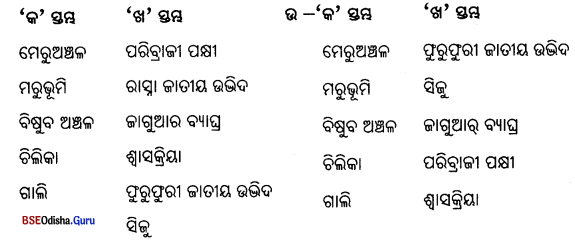
![]()




